Pet Birds
How Parakeets Can Safely Eat Grapes: A Step-by-Step Guide
Nourish your parakeet's diet with grapes safely by following these steps, but there's more to know for their well-being!
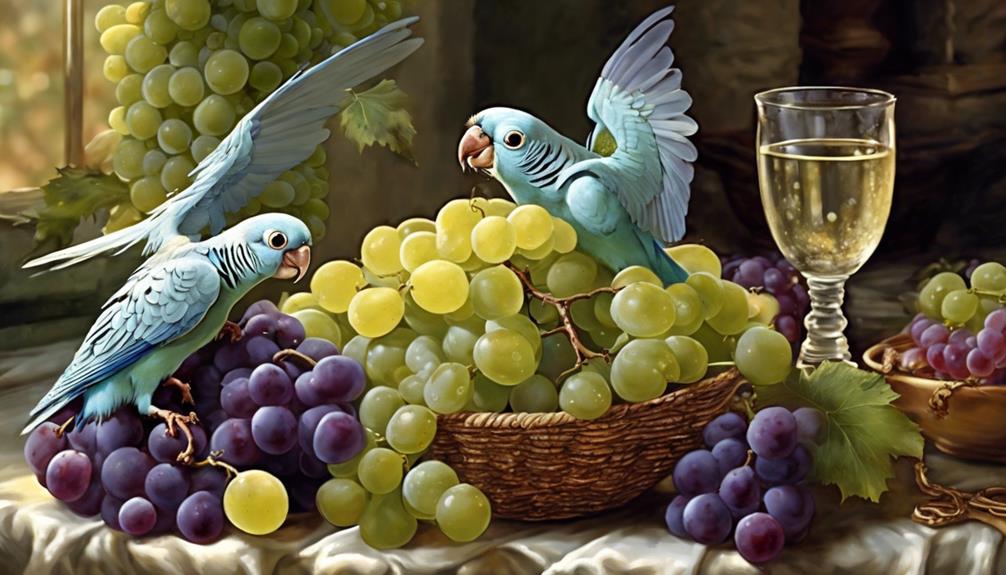
We can safely feed parakeets grapes by thoroughly washing them, cutting them into small pieces, and removing the seeds. Fresh grapes are the best option, and we should pay attention to our bird’s response and adjust the portion sizes as needed. It is crucial to monitor their behavior and digestion after they consume grapes. It is important to remember that incorporating grapes as a treat in a balanced diet is essential for our parakeet’s well-being.
Additional details can help enrich your feathered friend's diet.
Key Takeaways
- Wash grapes thoroughly to remove pesticides.
- Cut grapes into small, bite-sized pieces.
- Remove all seeds before offering.
- Monitor parakeet's reaction and adjust serving sizes.
- Offer fresh grapes as a healthy snack option.
Grapes as a Safe Parakeet Treat
Grapes are occasionally recommended as a vital treat for parakeets, but moderation and careful observation are important when introducing them into your bird's diet. Parakeets can enjoy seedless grapes as a healthy snack option. These fruits offer some benefits, such as being a good source of hydration and essential nutrients. However, it's essential to remember that grapes shouldn't make up a significant portion of your parakeet's diet. Observing any changes in behavior or digestion after your parakeet eats grapes is vital to make sure they're well-tolerated.
When considering dried grapes, also known as raisins, for your parakeet, remember that they can be a suitable treat as well. However, due to their concentrated sugar content, it's important to limit the serving size to prevent any potential health issues. By offering dried grapes in moderation, you can provide your parakeet with a tasty and enjoyable snack without compromising their overall well-being.
Preparing Grapes for Parakeets
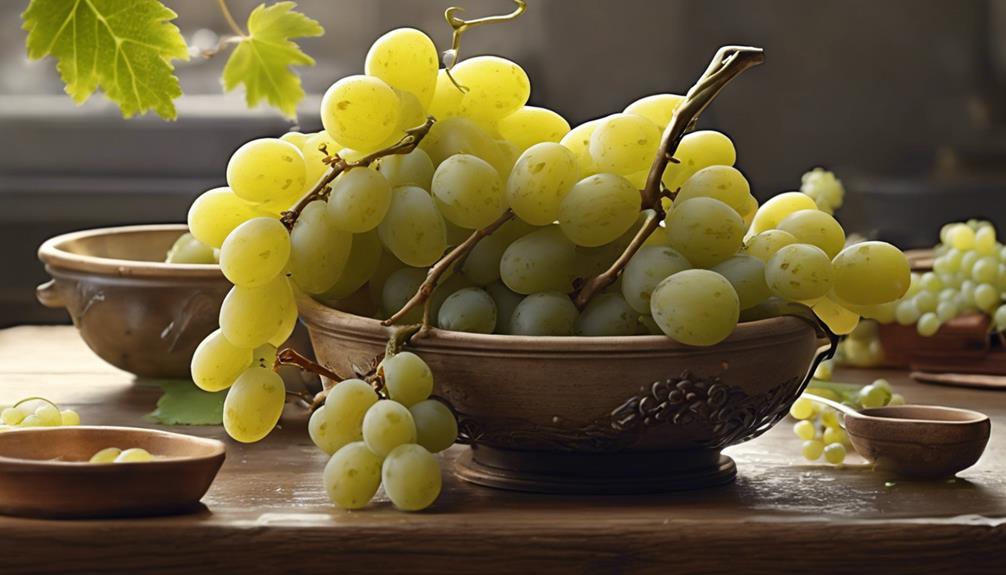
After considering the importance of incorporating grapes into a parakeet's diet with caution, the next step involves properly preparing this fruit to guarantee secure consumption for your feathered friend.
Begin by thoroughly washing the grapes to eliminate any pesticides or chemicals that may be present on the skin. Once cleaned, carefully cut the grapes into small, bite-sized pieces to prevent any choking hazards and to make them more manageable for your parakeet to eat. Remember to remove all seeds from the grapes before offering them to your pet, as seeds can pose a danger if ingested.
Opt for fresh grapes over dried ones, as fresh fruits are more hydrating and provide essential nutrients for your bird.
To safeguard your parakeet's well-being, closely monitor their reaction to grapes and adjust serving sizes accordingly based on their preferences and digestive comfort. By following these steps, you can safely introduce this nutritious treat into your parakeet's diet.
Serving Grapes to Your Parakeet
When providing grapes to your parakeet, ensure they're fresh, firm, and free of any signs of decay.
Before feeding them, it's crucial to wash the grapes thoroughly to eliminate any pesticides or residues that could harm your feathered friend.
Remember to cut the grapes into bite-sized pieces to prevent any choking hazards.
The quantity of grapes you offer should be based on your parakeet's preferences and size, ensuring they enjoy this treat without overindulging.
Be attentive to promptly remove any uneaten grapes to prevent spoilage in your parakeet's cage, maintaining a clean and healthy environment for them.
Monitoring Grape Consumption
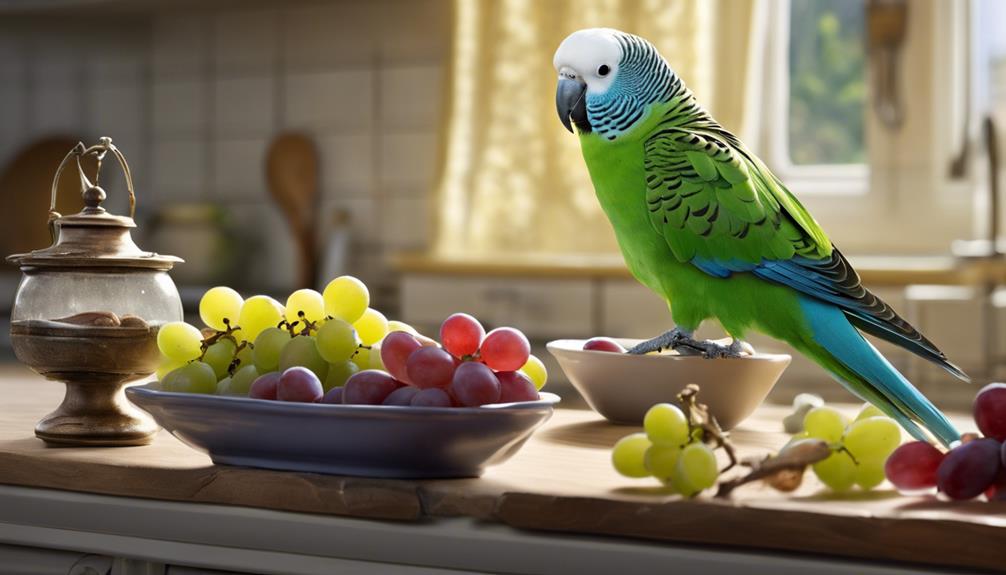
To guarantee your parakeet's well-being and diet balance, it's important to closely monitor their intake of grapes and observe any related changes in behavior or digestion. When it comes to monitoring your parakeet's grape consumption, here are some key points to keep in mind:
- Prevent Overeating: Monitor the amount of grapes your parakeet consumes to prevent overeating, which can lead to health issues and an imbalanced diet.
- Observe Behavioral and Digestive Changes: Watch for any changes in behavior or digestion after introducing grapes to your parakeet. This can indicate if the grapes are being well-tolerated or if adjustments are needed.
- Adjust Portion Sizes: Limit the quantity of grapes offered to your parakeet to avoid them dominating the diet. By observing your parakeet's response to grapes, you can adjust portion sizes accordingly to maintain a balanced diet.
Safety Tips for Feeding Grapes
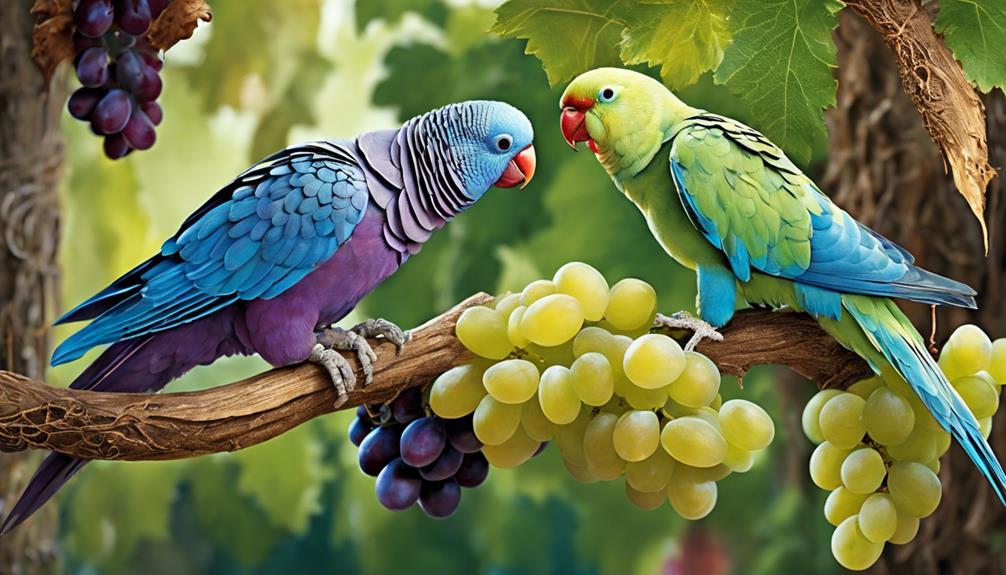
Rinsing grapes thoroughly to eliminate pesticides and chemicals is important before feeding them to parakeets. Cutting grapes into smaller, bite-sized pieces is essential to prevent choking hazards for our feathered friends.
Monitoring grape intake is crucial to prevent overfeeding and potential health issues, as grapes should be given as a treat rather than a staple in a parakeet's diet. It's significant to offer grapes as part of a varied diet that includes other suitable bird foods to guarantee our parakeets maintain overall health and well-being.
Frequently Asked Questions
Can Parakeets Eat a Grape?
Yes, parakeets can safely eat a grape. Seedless grapes are recommended for easy digestion. Grapes offer essential nutrients like potassium and vitamins A, C. Remember, moderation is key when incorporating grapes into a parakeet's diet.
How Do You Feed Parakeets Fruit?
We feed parakeets fruit by washing thoroughly, cutting into small pieces, and introducing slowly. We monitor for allergies and provide a balanced diet. Remove uneaten or spoiled fruit promptly. Variety is key for a healthy, happy parakeet.
What Is a Parakeets Favorite Human Food?
Grapes can be a parakeet's favorite human food due to their juicy sweetness. However, it's important to offer a balanced diet. We recommend introducing small amounts gradually to monitor reactions and guarantee overall health.
What Is a Parakeets Feeding Routine?
We maintain a balanced diet for parakeets, including pellets, fresh veggies, fruits like grapes, and occasional treats. Fresh water daily is essential, and we monitor food intake to prevent issues. Cleaning dishes regularly maintains hygiene.
Can Feeding Grapes to My Parakeet Cause It to Become Puffed Up?
Feeding grapes to your parakeet can be one of the reasons for a puffed up parakeet. Grapes contain toxins that can adversely affect your bird’s health, leading to symptoms like puffing up. It’s best to avoid feeding your parakeet grapes and opt for safe fruits and vegetables instead.
Conclusion
To sum up, feeding grapes to your parakeet can be an enjoyable and safe treat when done correctly.
By following the steps outlined in this guide, you can guarantee that your feathered friend enjoys this delicious snack without any risks.
Remember to always monitor their consumption and follow safety tips to keep them healthy and happy.
So go ahead, let your parakeet indulge in some juicy grapes – it's a treat they'll squawk about!
Paul’s love for animals knows no bounds. As a dedicated writer and animal lover, Paul brings a unique perspective to our team. His firsthand experiences with various animals enrich our content and provide valuable insights into their behavior and needs. Whether he’s sharing tips for pet care or shedding light on pressing conservation issues, Paul’s passion for animals shines through in everything he does.
Pet Birds
Pet Birds Guide: Care Tips and Breed Info
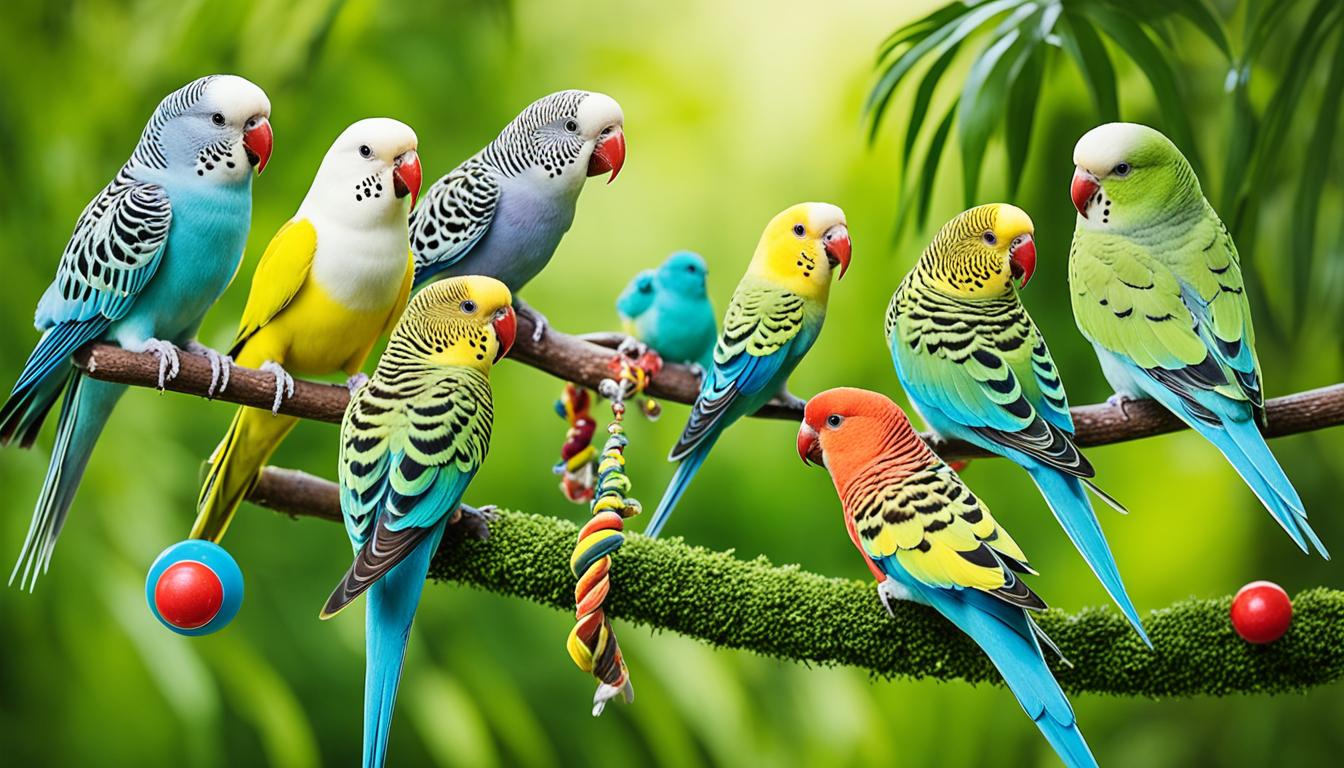
Did you realize that approximately 6.9 million households in the United States have pet birds? Indeed, these feathered companions are popular and cherished by many. Having a pet bird can bring happiness, companionship, and a special connection to the natural world. However, looking after them requires knowledge and attentiveness to guarantee their well-being. In this detailed guide, we will offer you crucial care suggestions and breed information to assist you in caring for your pet birds and ensuring they lead joyful and healthy lives.
Key Takeaways:
- Proper pet bird care is essential for their well-being and happiness.
- Health, behavior, habitat, feeding, training, and enrichment are key aspects to consider.
- Regular veterinary check-ups and a balanced diet are crucial for their health.
- Understanding their behavior helps create a harmonious bond with your pet bird.
- Enrichment activities and toys promote mental stimulation and overall well-being.
Health
Ensuring the good health of our pet birds is our top priority. At [Brand Name], we understand the importance of proper care and attention to promote their overall well-being. Here are some key aspects of pet bird health that every owner should be aware of:
Nutrition and Veterinary Check-ups
Providing a balanced and nutritious diet is essential for maintaining the health of pet birds. A combination of high-quality pellets, fresh fruits, and vegetables will ensure they receive the necessary vitamins and minerals. However, it is always advisable to consult a veterinarian to determine the specific dietary needs of your bird, as they may vary depending on the species and individual requirements.
Regular check-ups with a veterinarian are crucial to monitor the overall health of your pet bird. These visits allow professionals to assess their condition, provide necessary vaccinations, and detect any potential health issues at an early stage.
Parasite Control
Parasite infestations can severely affect the health of pet birds. External parasites like mites and lice can cause discomfort, itching, and even lead to secondary infections. Internal parasites such as worms can negatively impact their digestive system and nutrient absorption.
To prevent and control parasites, use appropriate parasite control products recommended by your veterinarian. Regularly inspect your bird’s feathers, skin, and feces for any signs of infestation. Promptly consult a professional if you notice any abnormal behavior or symptoms.
Bathing, Beak and Claw Maintenance
Bathing is not only a means for pet birds to keep their feathers clean; it also helps them maintain proper plumage and skin health. Bathing removes accumulated dirt, debris, and excess oil from their feathers, promoting a healthy and vibrant appearance.
Encourage your pet bird to bathe by providing a shallow dish filled with lukewarm water. Some birds may prefer mist baths, while others enjoy bathing under a gentle stream of water. Observe your bird’s preferences and ensure they have access to bathing options that suit their comfort.
Beak and claw maintenance is another crucial aspect of pet bird health. Regularly check their beaks and claws for overgrowth, cracks, or abnormalities. Provide appropriate chew toys, perches, and materials to help keep their beaks sharp and claws trimmed naturally.
Monitoring Health
As pet owners, it is essential to closely monitor the health of our feathered companions. Birds are adept at disguising illness, so it is crucial to be observant and proactive in recognizing any signs of illness or changes in behavior.
Keep an eye out for the following indications of potential health issues:
- Decreased appetite
- Decreased activity level
- Changes in the appearance of feathers, such as fluffing or discoloration
- Difficulty breathing or wheezing
- Abnormal droppings, including changes in color, consistency, or frequency
- Unusual aggression or irritability
If you notice any of these signs or have concerns about your pet bird’s health, consult a veterinarian immediately. Prompt and appropriate medical attention can make a significant difference in the well-being and longevity of your beloved feathered friend.
We care deeply about the health and happiness of pet birds. By providing proper nutrition, regular veterinary care, parasite control, bathing, and beak and claw maintenance, we can ensure that our feathered companions thrive and lead fulfilling lives.
Behavior
Pet birds are fascinating creatures that exhibit a wide range of behaviors, each with its own meaning. Understanding their behavior is essential for their overall wellbeing and can help you build a strong and meaningful bond with your feathered friend.
Let’s take a closer look at some common behaviors displayed by pet birds:
- Preening: Preening is a natural behavior in which birds use their beaks to clean and groom their feathers. By spreading oil from their preen gland, they keep their feathers in good condition, ensuring they remain sleek and waterproof.
- Messing up the cage: It’s not uncommon for pet birds to mess up their cages by scattering food, throwing feathers, or knocking over toys. This behavior can indicate boredom, frustration, or even a cry for attention. Providing plenty of stimulating toys and spending quality time with your bird can help prevent this behavior.
- Beak grinding: If you notice your bird grinding its beak, it is a sign of relaxation and contentment. Beak grinding is an instinctive behavior that helps birds relax and feel secure in their environment.
- Regurgitating: While it may seem strange, regurgitating is a natural behavior in birds. They regurgitate food to feed their mates or chicks and also as a display of affection. However, in some cases, regurgitating can be a sign of illness, so it’s important to monitor your bird’s behavior for any changes.
- Hiding: Birds may sometimes seek out hiding spots in their cage, such as behind toys or in cozy corners. This behavior is a normal part of their instinctual response to feeling vulnerable or threatened. Providing suitable hiding places within the cage can help your bird feel safe and secure.
- Vocalizing: Birds are known for their melodious voices and love to vocalize. Whether it’s chirping, whistling, or mimicking sounds, vocalization is a natural way for birds to communicate, express their emotions, and establish their territory.
Understanding your pet bird’s behavior will help you identify any potential issues or discomfort they may be experiencing. By observing their actions and providing a stimulating and nurturing environment, you can ensure your bird thrives and enjoys a happy and fulfilling life.
Take a look at the image below to see a beautiful bird engaging in natural behaviors:
Habitat
Creating a suitable habitat for your pet bird is essential for their health and well-being. One of the most crucial aspects of their habitat is providing a large cage that allows them to fly and move around comfortably. A spacious cage provides the necessary room for exercise and promotes a happy and active lifestyle for your feathered friend.
When selecting a cage, consider the size of your pet bird. Different bird species require different cage sizes to accommodate their wingspan and natural behaviors. It’s best to choose a cage that exceeds the minimum recommended size for your specific bird breed.
Here is a table comparing the recommended cage sizes for popular pet bird species:
| Pet Bird Species | Minimum Cage Size |
|---|---|
| African Grey Parrot | 36″ x 24″ x 48″ |
| Budgerigar (Parakeet) | 18″ x 18″ x 24″ |
| Cockatiel | 24″ x 24″ x 30″ |
| Macaw | 48″ x 36″ x 60″ |
Remember, these are just minimum cage sizes, and providing a larger cage whenever possible is highly recommended. A larger cage gives your pet bird more space to exercise their wings, climb, and explore, which contributes to their overall happiness and mental stimulation.
Additionally, cage placement is another crucial aspect to consider. Place your pet bird’s cage in a location that provides a sense of security and allows them to observe their surroundings comfortably. Avoid placing the cage near drafty areas or direct sunlight, as these conditions can be harmful to their health.
Expert Tip:
Ideally, place the cage in a room where your family spends a significant amount of time. This way, your pet bird can feel like part of the family and enjoy the interaction and companionship.
Providing a safe and stimulating habitat that includes a large and appropriately sized cage, along with strategic placement in your home, is essential for ensuring the well-being and happiness of your pet bird.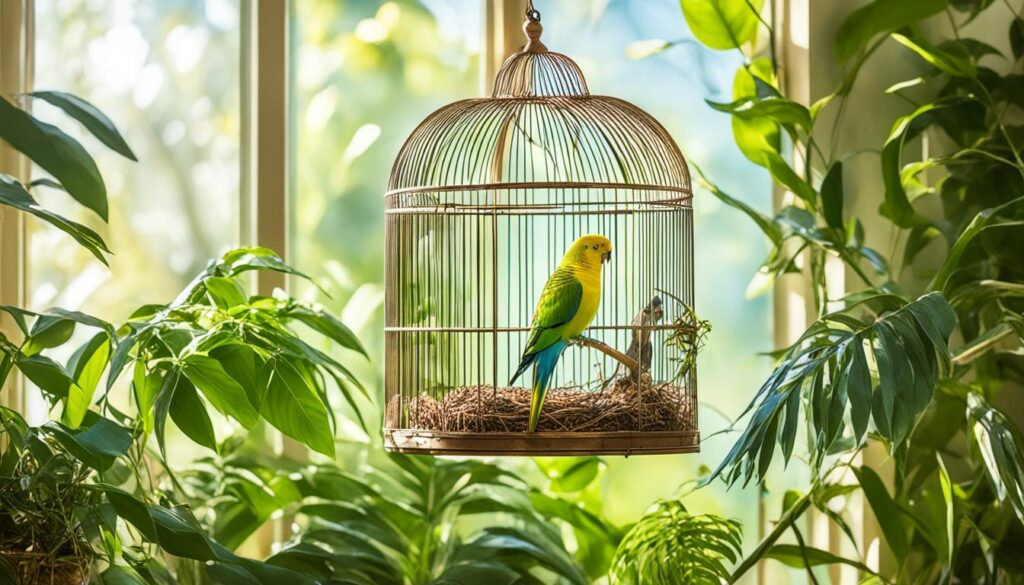
In the next section, we will discuss the importance of proper nutrition and feeding habits for your pet bird.
Feeding
Proper nutrition is crucial for the health of pet birds. At [Brand Name], we understand the importance of providing a balanced diet that meets their unique nutritional needs.
Feeding your pet bird a balanced diet is essential for their overall well-being. It is recommended to offer a mix of pellets and human table foods to ensure they receive a variety of nutrients. Pellets are specifically formulated to provide the necessary vitamins and minerals, while table foods add a delightful diversity to their meals.
When incorporating table foods into their diet, it’s important to focus on fresh fruits and vegetables. These natural and wholesome options provide essential vitamins, minerals, and antioxidants that support their health and boost their immune system. From crunchy carrots to juicy berries, there are numerous fruits and vegetables that your pet bird will love. Just make sure to avoid any toxic or dangerous foods.
“We believe that a balanced diet is the cornerstone of pet bird care. By offering a variety of foods, including fresh fruits and vegetables, you can provide optimal nutrition for your feathered friend.”

In addition to a varied diet, it is important to ensure your pet bird has constant access to fresh water. Clean and freshwater should be available at all times, as dehydration can be detrimental to their health. Regularly check their water dish and replace it with fresh water daily.
As responsible pet owners, it is our duty to provide our feathered friends with the nutrition they need for a happy and healthy life. By offering a balanced diet, including fresh fruits and vegetables, and ensuring they have access to constant fresh water, we can promote their overall well-being and longevity.
Training
In order to provide the best care for your pet bird, training plays a crucial role. It helps in socializing your bird, teaching them to fly, and gradually introducing them to new experiences and environments. Positive reinforcement techniques are highly effective in training birds, as they respond well to rewards and encouragement.
When it comes to socialization, it is important to expose your bird to different people, pets, and environments. This helps them develop confidence and adaptability, making them more comfortable in various situations. Encourage interaction with family members and friends, but always ensure their safety and well-being.
“Training your bird to fly is an essential part of their physical and mental enrichment.”
Teaching your bird to fly is an essential part of their physical and mental enrichment. Start by creating a safe and controlled environment, such as a spacious room with no potential hazards. Begin with short flights, gradually increasing the distance as your bird becomes more comfortable and confident. Always supervise their flying sessions to prevent accidents.
Introducing your bird to new experiences and environments can be done in a gradual and controlled manner. Start with familiar and safe areas, gradually exposing them to different rooms, sounds, and objects. This helps in reducing fear and anxiety and encourages exploration and curiosity.
Flying Training Tips:
- Start training in a safe and controlled environment
- Gradually increase the distance of flights
- Supervise flying sessions to prevent accidents
- Use positive reinforcement techniques, such as treats and praise
- Be patient and consistent in your training approach
Remember, every bird is unique and will have their own pace of learning. It is important to be patient, consistent, and understanding during the training process.
| Training Tips | Description |
|---|---|
| Positive Reinforcement | Use treats, praise, and rewards to encourage desired behaviors. |
| Patient and Consistent | Be patient and consistent in your training approach, allowing your bird to learn at their own pace. |
| Supervised Flying | Always supervise your bird during flying sessions to ensure their safety. |
| Gradual Exposure | Gradually introduce your bird to new experiences and environments to prevent overwhelming them. |
| Socialization | Expose your bird to different people, pets, and environments to promote socialization skills. |
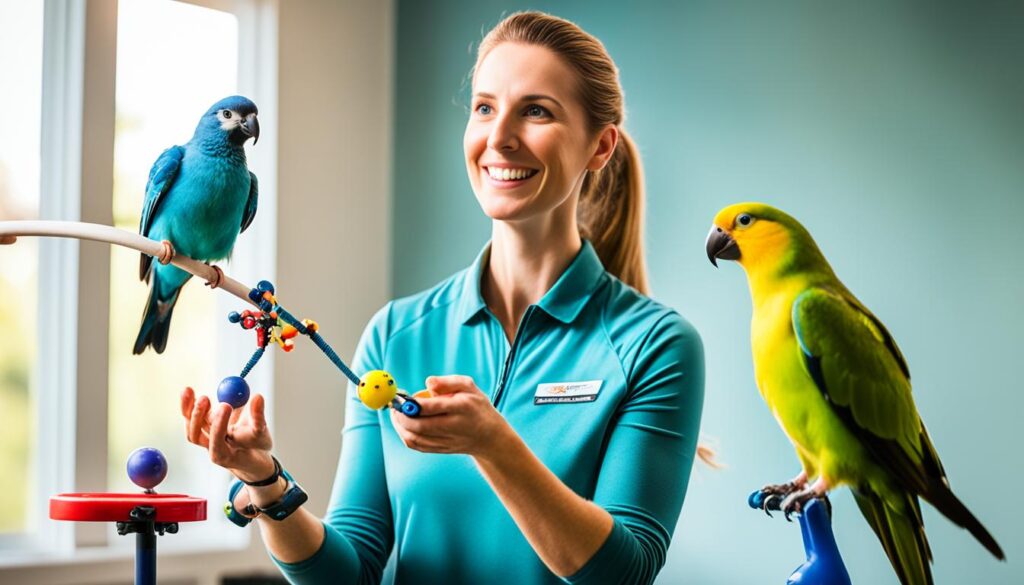
Enrichment
Enrichment is a vital aspect of caring for pet birds, as it plays a crucial role in keeping them mentally stimulated and engaged. Just like humans, birds thrive when their minds are challenged and their natural instincts are nurtured. Providing a variety of toys and perches is essential for their overall wellbeing and happiness.
Birds have a natural inclination to chew, play, and explore their environment. By offering a range of toys specifically designed for birds, we can satisfy these natural behaviors and prevent boredom. Toys that encourage problem-solving, such as puzzle toys or foraging toys, are great choices for pet bird enrichment. These toys not only keep the birds occupied but also allow them to exercise their intelligence and natural problem-solving skills.
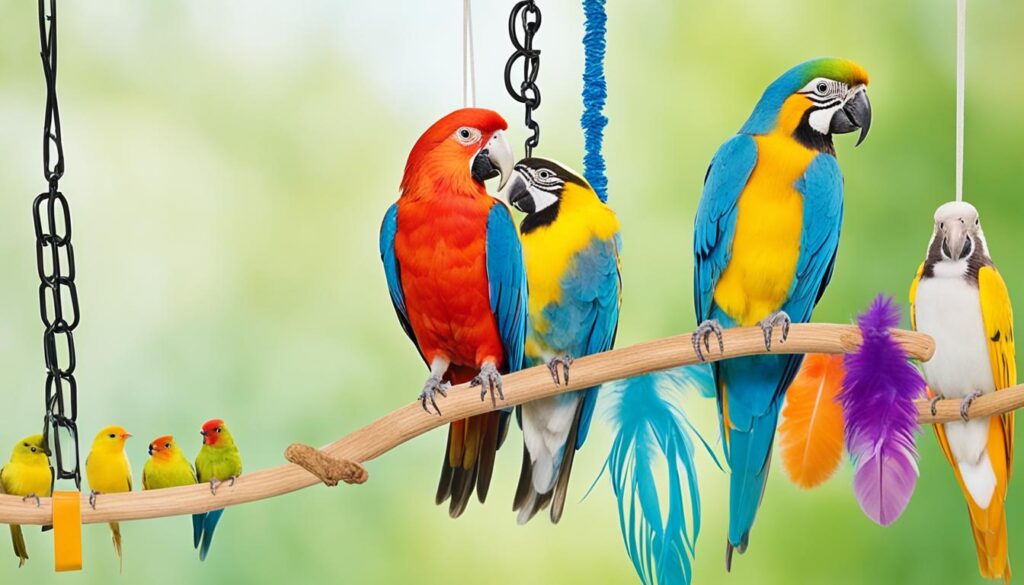
Perches are another important element of bird enrichment. They serve as natural platforms for birds to rest, exercise, and observe their surroundings. Different types of perches, such as wooden perches, rope perches, or natural branches, provide variety and promote foot and leg health. Rotating perches regularly can also help prevent foot problems caused by constant pressure on the same areas.
Choosing Toys and Perches
When selecting toys for your pet bird, it’s important to consider their species, size, and preferences. Birds have different play styles, so providing a variety of toys allows them to explore different textures, colors, and shapes. Interactive toys, such as puzzle feeders or treat-dispensing toys, can engage their problem-solving skills and provide mental stimulation.
Similarly, perches should vary in diameter and texture to promote foot health. Providing both rough and smooth surfaces on perches helps maintain the health and strength of their feet and talons. It’s important to choose non-toxic materials for both toys and perches to ensure the safety of your feathered friend.
Benefits of Enrichment
Enrichment not only keeps birds entertained but also has several other benefits. It helps prevent behavioral issues that can arise from boredom and lack of mental stimulation. When birds are mentally engaged and stimulated, they are less likely to exhibit negative behaviors such as feather plucking, screaming, or aggression.
Additionally, enrichment promotes physical exercise and reduces stress in birds. Toys that encourage physical activity, such as swings or ladders, provide opportunities for birds to stay active and maintain their physical health. Mental and physical stimulation through enrichment helps improve their overall quality of life.
Health Problems
Pet birds, like any other animals, can be prone to various health problems. As responsible pet owners, it is crucial for us to be aware of these common conditions and take necessary steps to ensure the well-being of our feathered friends. Some of the prevalent health issues in pet birds include respiratory diseases, scaly face, and yeast infections.
Respiratory Diseases
Respiratory diseases are a significant concern in pet birds and can be caused by a variety of factors, including bacterial or viral infections, environmental factors, and poor ventilation. These diseases can manifest in symptoms such as difficulty breathing, sneezing, nasal discharge, coughing, and wheezing.
If you notice any signs of respiratory distress in your pet bird, it is essential to seek veterinary care immediately. Early diagnosis and treatment can help prevent further complications and improve the chances of a successful recovery.
Scaly Face
Scaly face, also known as scaly leg, is a common condition in pet birds caused by a mite infestation. These tiny parasites burrow under the skin, leading to the formation of crusty scales around the bird’s beak, face, and legs. If left untreated, scaly face can cause discomfort, disfigurement, and secondary infections.
To treat scaly face, your veterinarian may recommend medication such as topical creams or oral treatments. It is important to follow their instructions carefully and ensure proper treatment to eliminate the mites and alleviate the symptoms.
Yeast Infections
Yeast infections, particularly candidiasis, can affect pet birds, causing issues such as oral and crop lesions, weight loss, excessive drinking and urination, and changes in droppings. These infections are commonly caused by an overgrowth of yeast in the bird’s digestive system, often due to a weakened immune system or improper diet.
If you suspect your pet bird has a yeast infection, it is crucial to consult with a veterinarian for a proper diagnosis and treatment plan. Treatment may involve antifungal medications, dietary modifications, and supportive care to boost the bird’s immune system.
“The health and well-being of our pet birds depend on our awareness and proactive approach in addressing common health problems. By monitoring their respiratory health, addressing scaly face mites, and properly managing yeast infections, we can provide our beloved feathered companions with the care they need.”
In addition to these health issues, pet birds may also experience other conditions such as feather plucking, egg-binding, and nutritional deficiencies. Regular veterinary check-ups, a healthy diet, and a clean living environment are essential for minimizing the risk of these problems and maintaining the overall health of your pet bird.
| Health Problem | Symptoms | Treatment |
|---|---|---|
| Respiratory Diseases | – Difficulty breathing – Sneezing and nasal discharge – Coughing and wheezing |
– Veterinary examination – Medication – Environmental adjustments |
| Scaly Face | – Crusty scales around beak, face, and legs – Discomfort and disfigurement |
– Veterinary examination – Topical or oral medication – Hygiene and cleaning measures |
| Yeast Infections | – Oral and crop lesions – Weight loss – Excessive drinking and urination |
– Veterinary examination – Antifungal medication – Dietary modifications |
Remember, being knowledgeable about common health problems in pet birds and seeking prompt veterinary care is essential for ensuring their well-being and longevity. By addressing these issues early on, we can help our feathered companions live healthier, happier lives.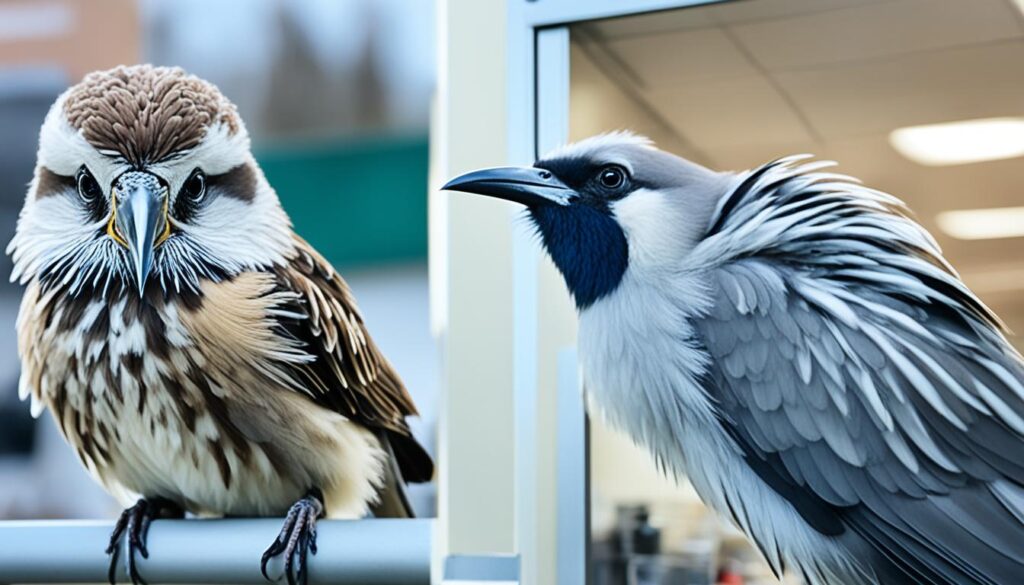
Zoonotic Diseases
It’s essential to be aware that some diseases in pet birds can be transmitted to humans. One well-known zoonotic disease in pet birds is psittacosis, also known as parrot fever. To prevent the spread of zoonotic diseases and ensure the health and safety of both birds and humans, we must take necessary precautions.
Safety Tips for Disease Prevention
- Regular Handwashing: Proper and regular handwashing is crucial to prevent the transmission of zoonotic diseases. Wash your hands thoroughly with soap and water after handling or caring for pet birds.
- Maintaining Proper Hygiene: Keeping a clean and hygienic environment for both birds and humans is essential. Regularly clean bird cages, feeders, and other equipment to minimize the risk of disease transmission.
- Avoiding Close Contact: While interacting with pet birds, it’s important to avoid close contact, especially if you have a weakened immune system or are at a higher risk of contracting infections.
- Proper Ventilation: Ensure that the bird’s habitat has proper ventilation to reduce the risk of airborne disease transmission. Proper airflow helps maintain a healthy environment for both birds and humans.
- Safe Handling Practices: Follow safe handling practices when interacting with pet birds to minimize the risk of scratches or bites that can lead to infection.
“Preventing the spread of zoonotic diseases is crucial for the well-being of both pet birds and humans. By following these safety tips, we can ensure a healthy and harmonious coexistence.”
Prevalence of Zoonotic Diseases in Pet Birds
| Zoonotic Disease | Prevalence |
|---|---|
| Psittacosis (Parrot Fever) | Common in pet birds, especially parrots and cockatiels |
| Cryptosporidiosis | Occasional cases reported in pet birds |
| Salmonellosis | Infrequent cases reported in pet birds |
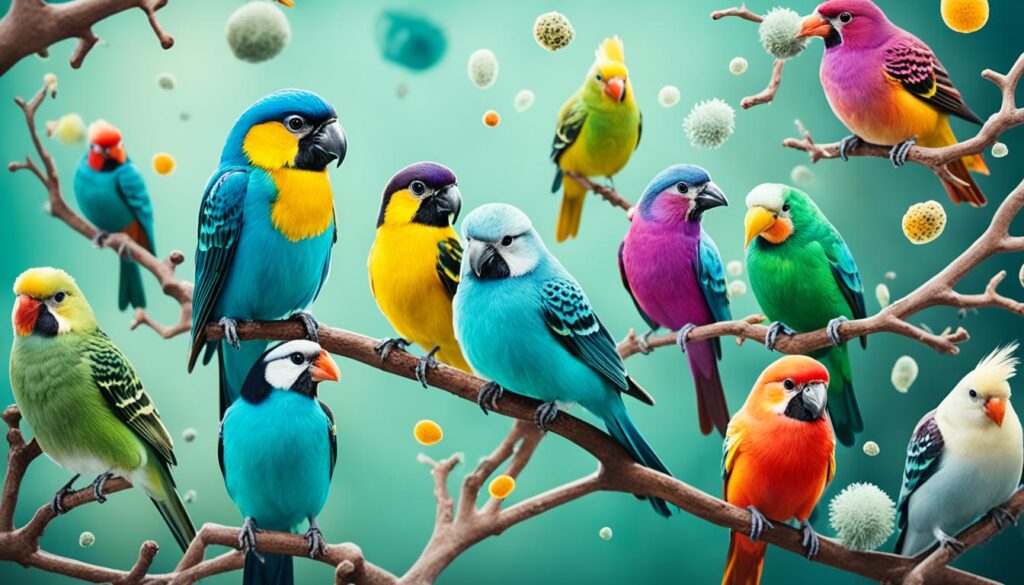
While psittacosis is the most commonly known zoonotic disease in pet birds, other diseases like cryptosporidiosis and salmonellosis can also be transmitted. Understanding the prevalence of zoonotic diseases can help pet owners take appropriate precautions and seek immediate medical attention when needed.
Choosing a Pet Bird
When it comes to choosing a pet bird, there are several factors to consider. Each bird species has its own unique appearance, personality, companionship qualities, and life span. By understanding these different traits, you can make an informed decision and select a bird that aligns with your preferences and lifestyle.
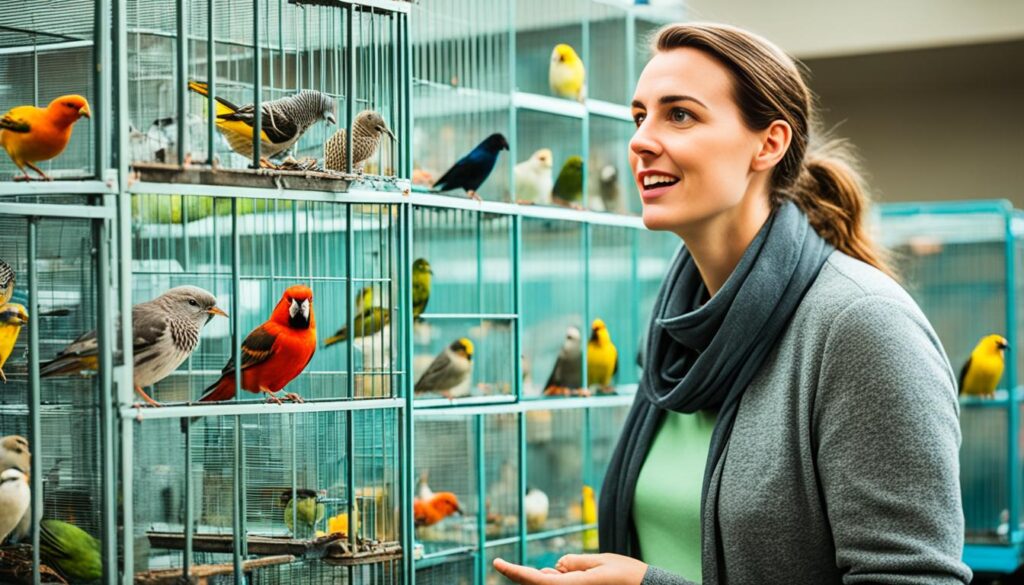
Appearance
The appearance of a bird can vary greatly depending on its species. Some birds are known for their vibrant plumage and striking patterns, while others may have more subdued colors. Take the time to research different bird species and consider which ones are visually appealing to you.
Personalities
Birds have unique personalities, just like humans. Some birds may be outgoing and social, while others are more reserved and independent. It’s important to choose a bird whose personality matches your own and the type of companionship you’re looking for.
Companionship
Pet birds can provide wonderful companionship. They can be loving, affectionate, and enjoy spending time with their owners. If you’re looking for a bird that will bond closely with you and enjoy interacting, certain species such as parrots or cockatiels may be a good choice.
Life Span
The life span of a pet bird can vary greatly depending on the species. Some birds, such as budgies and cockatiels, have an average life span of 10-15 years, while others, like larger parrots, can live for several decades. Consider the commitment and responsibility that comes with owning a bird with a longer life span.
“Choosing a pet bird requires careful consideration of their appearance, personalities, companionship qualities, and life span. By understanding these factors, you can select the perfect feathered companion that will bring joy and companionship into your life.”– Bird Lovers
Preparing for Your Bird
Before bringing home a pet bird, it is vital to make the necessary preparations to ensure their well-being and happiness. By taking the time to create a safe and comfortable environment, you can provide your feathered friend with the care they deserve. Here are a few essential steps to consider:
- Provide a Balanced Diet: A balanced diet is crucial for the overall health of your pet bird. It is recommended to offer a mix of commercially available bird pellets and fresh fruits and vegetables. This variety ensures they receive the necessary nutrients to thrive. Avoid feeding them processed foods or items that may be harmful.
- Choose Suitable Caging: Selecting the right cage is essential for the well-being and safety of your pet bird. It should be spacious enough for them to move around, stretch their wings, and play. Opt for a cage made of bird-safe materials, with appropriate bar spacing to prevent escape or injury. Provide perches and toys inside the cage to keep them mentally stimulated.
- Maintain Proper Sanitation: Cleanliness is key to ensuring good health for both you and your bird. Regularly clean and disinfect the cage, removing any droppings or debris. Replace bedding material or liner to maintain a clean and hygienic environment. Maintain a routine cleaning schedule to prevent the buildup of bacteria and odors.
- Schedule Regular Veterinary Check-ups: Just like any other pet, your bird requires regular veterinary care. Find a knowledgeable avian veterinarian who can provide routine check-ups, vaccinations, and address any health concerns. Regular examinations help detect and prevent any potential health problems before they become serious.
By preparing for your bird’s arrival with a balanced diet, suitable caging, proper sanitation, and regular veterinary check-ups, you can ensure a happy and healthy life for your new feathered friend. Building a strong foundation of care and responsibility sets the stage for a long and fulfilling companionship.
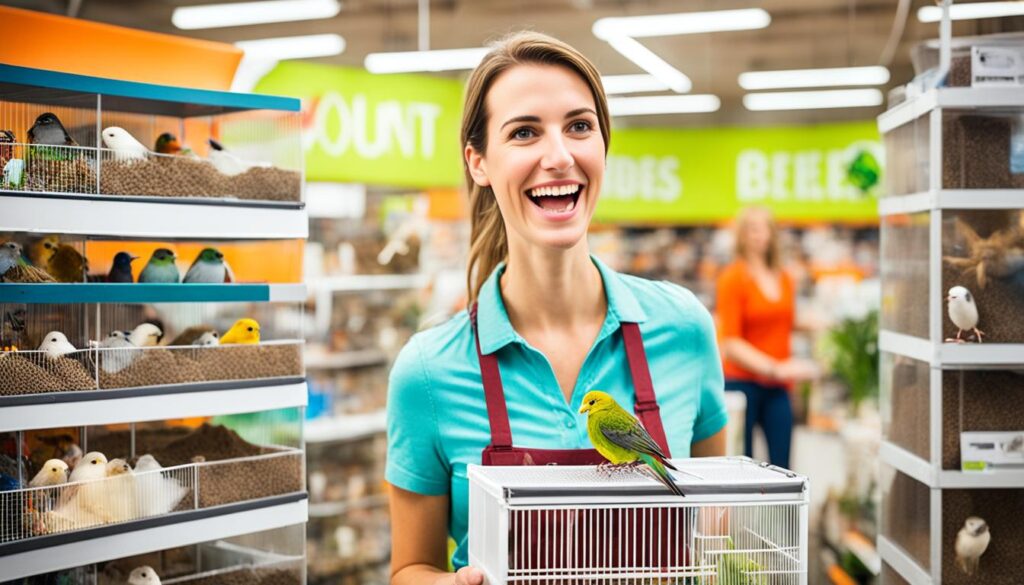
Finding a Pet Bird
When it comes to finding a pet bird, there are several sources to consider. Whether you’re looking for a colorful parrot, a charming canary, or a friendly cockatiel, you have options to choose from. Here are the main sources:
Pet Shops
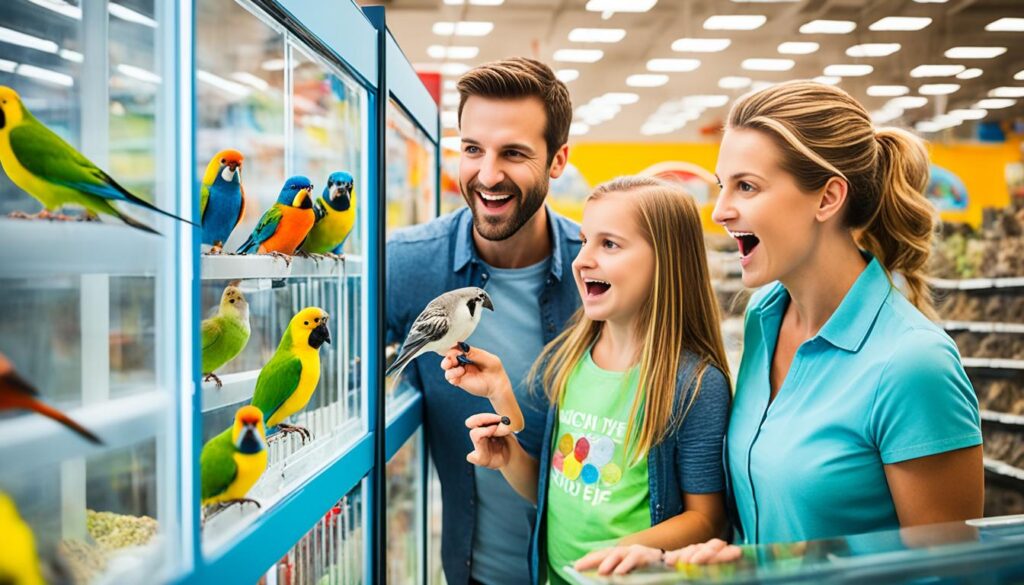 Pet shops are a popular choice for finding pet birds. They offer a wide variety of bird species and breeds, giving you the opportunity to browse and select the perfect bird for your home. Additionally, pet shops often have knowledgeable staff who can provide information and guidance on bird care.
Pet shops are a popular choice for finding pet birds. They offer a wide variety of bird species and breeds, giving you the opportunity to browse and select the perfect bird for your home. Additionally, pet shops often have knowledgeable staff who can provide information and guidance on bird care.
Non-Profit Organizations
Non-profit organizations dedicated to animal welfare also play a role in finding pet birds. These organizations rescue, rehabilitate, and rehome birds in need, giving them a second chance at a loving home. Adopting from a non-profit organization not only gives you the opportunity to provide a home for a bird in need but also supports their mission of animal welfare.
Reputable Breeders
Working with a reputable breeder is another option when finding a pet bird. Breeders specialize in breeding specific bird species and can provide valuable insights into the breed’s characteristics, care requirements, and health history. By choosing a reputable breeder, you can ensure that you are getting a healthy and well-socialized bird.
Remember to do thorough research and choose a reliable source when finding a pet bird. Consider factors such as the bird’s physical appearance, behavior, and the reputation of the source. This will help you make an informed decision and bring home a healthy and happy feathered friend.
Caring for Your Bird and Its Environment
Caring for a pet bird requires regular attention and care. It’s important to provide your feathered friend with a clean and safe environment to thrive in. This includes maintaining cleanliness in their surroundings, as birds can be messy creatures. A suitable cage with ample space for them to move around is necessary for their comfort and well-being.
Proper bird care also involves ensuring they have access to fresh food and water at all times. Providing a balanced diet with a mix of pellets, seeds, and fresh fruits and vegetables is essential for their nutrition. Fresh and clean water should be readily available to keep them hydrated.
Regularly cleaning their cage, including the perches, toys, and dishes, helps prevent the buildup of dirt, bacteria, and waste. This promotes a healthy and hygienic environment for your bird. Ensuring a clean environment is especially important for their respiratory health, as birds are more susceptible to respiratory diseases.
When it comes to housetraining your bird, consistency is key. Establish a designated bathroom area in their cage and encourage them to use it by placing bird litter or paper in that spot. Reinforce positive behavior by rewarding them when they use the designated area. Patience and gentle training techniques will help in the housetraining process.
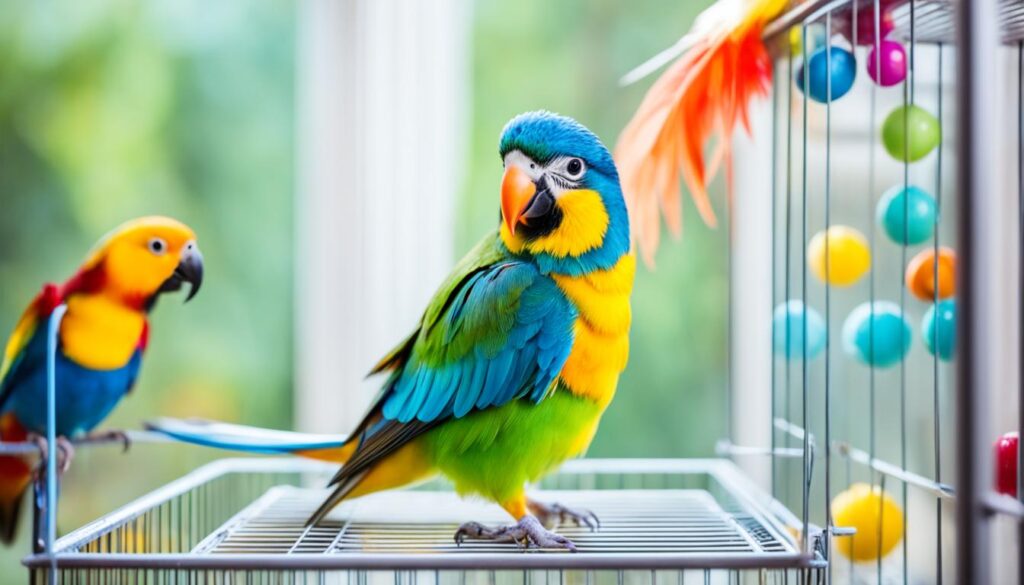
Training Your Bird to Talk
Many pet birds have the amazing ability to learn to talk, becoming delightful companions who can communicate with their owners. However, training a bird to talk requires patience, consistency, and effort from the owner. While some bird species, such as parakeets and certain parrot species, are more likely to learn to talk, any bird can potentially pick up words and phrases.
When training your pet bird to talk, it is important to provide them with a variety of words and phrases to learn and practice. Here are some tips to help you in the training process:
- Be patient: Training a bird to talk takes time, so it’s essential to have patience and not rush the process. Each bird learns at its own pace, and some may take longer than others to start speaking.
- Use repetition: Birds learn by repetition, so consistently using the same words and phrases will help them grasp the sounds and meanings. Repeat the words frequently throughout the day, especially during positive interactions and training sessions.
- Speak clearly: Enunciate words clearly and pronounce them consistently. This will help your bird understand the sounds and imitate them more accurately.
- Use positive reinforcement: Reward your bird when they make an effort to speak or imitate words. Offer treats, praise, or a favorite toy to reinforce their progress and encourage further learning.
- Be consistent: Training sessions should be regular, but short and frequent. Aim for sessions of 10 to 15 minutes, a few times a day, to keep your bird engaged and focused.
- Provide a stimulating environment: Birds thrive in an environment that stimulates their curiosity and encourages vocalization. Play soft music, provide toys and mirrors, and interact with your bird to keep them interested and motivated to learn.
Remember, each bird is unique, and not all birds will talk as effectively or as clearly as others. Some may develop a larger vocabulary, while others may only pick up a few words or phrases. Regardless of their level of speaking ability, the joy and companionship they provide are priceless.
With patience, consistency, and a variety of words and phrases, you can encourage your pet bird to learn and communicate with you through speech. Enjoy the process and celebrate every word your feathered friend learns—it’s a remarkable achievement!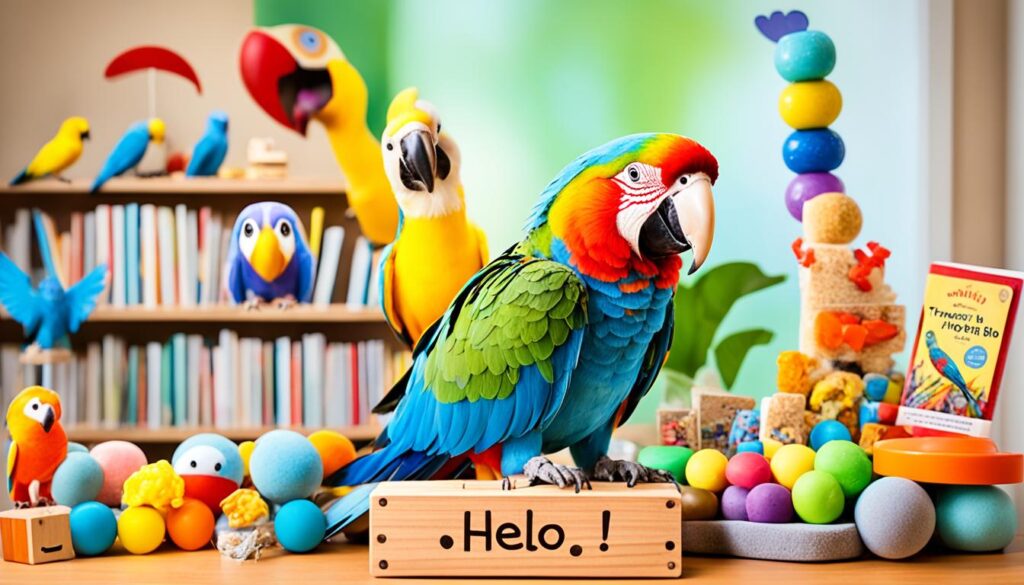
Conclusion
Owning a pet bird can be a wonderful and fulfilling experience. By providing proper care and attention, you can ensure that your feathered companion lives a happy and healthy life. Pet bird care involves a few essential aspects that should not be overlooked.
First and foremost, a balanced diet is crucial for your bird’s well-being. Offering a mix of pellets and fresh fruits and vegetables provides them with the necessary nutrients for a healthy diet. Additionally, ensure they always have access to clean and fresh water.
Creating a suitable environment is also important. Make sure your bird has a spacious cage where they can move around freely. Place their cage in an area that is well-ventilated and away from drafts or direct sunlight. Regular cleaning and hygiene maintenance will help keep their environment clean and comfortable.
Lastly, nurturing a strong bond and companionship with your pet bird is essential. Spend quality time with them, provide mental and physical stimulation through toys and playtime, and show them love and attention. Your bird will thrive in an environment filled with care and affection.FAQ
What are the essential care tips for pet birds?
How can I understand the behavior of my pet bird?
What should I consider when providing a habitat for my pet bird?
What should I feed my pet bird?
How can I train my pet bird?
How can I keep my pet bird mentally stimulated?
What are some common health problems in pet birds?
Can diseases in pet birds be transmitted to humans?
What factors should I consider when choosing a pet bird?
How can I prepare for the arrival of my pet bird?
Where can I find a pet bird?
How do I care for my pet bird and its environment?
Can pet birds learn to talk?
Dana is our Lead Content Writer, bringing a wealth of knowledge and expertise to our team. With a background deeply rooted in animal studies and a profound love for all creatures, Dana is dedicated to crafting engaging and informative content that resonates with our audience. With Dana at the helm, you can trust that our content is accurate and engaging, catering to the diverse interests of animal enthusiasts everywhere.
Pet Birds
Discover Top Bird Breeders in Indiana
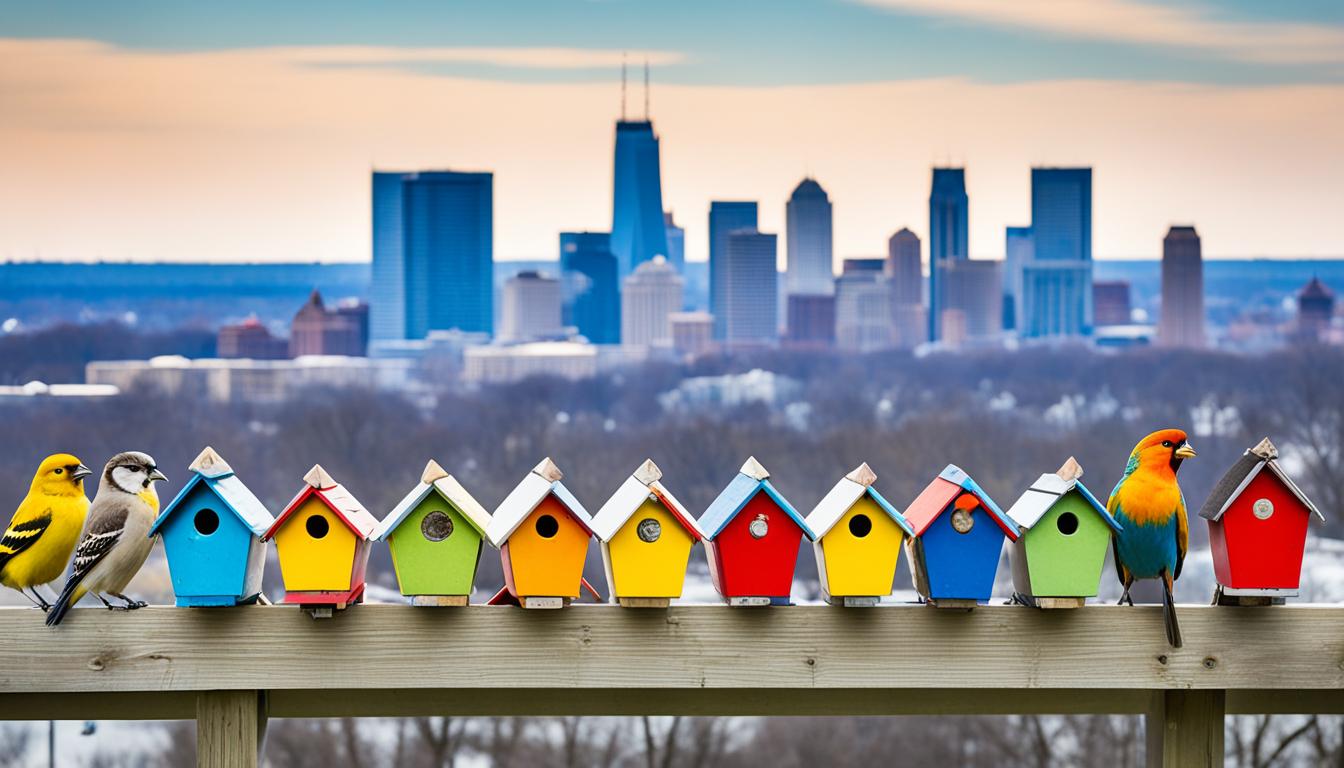
Did you realize that Indiana is where some of the best bird breeders in the nation are located? With a deep avian heritage and a lively bird lover community, this Midwestern state provides a sanctuary for experienced enthusiasts and new pet owners alike. Whether you are looking for a colorful parrot, a sweet cockatiel, or a lovely lovebird, Indiana’s bird breeders offer a wide variety of species to select from.
Key Takeaways:
- Indiana is home to reputable bird breeders who offer a wide variety of bird species.
- Bird breeders in Indiana are known for providing healthy and vibrant birds for homes and aviaries.
- When choosing a bird breeder, it’s important to consider factors such as licensing, health history, and facility conditions.
- Popular pet bird species in Indiana include parrots, cockatiels, and lovebirds.
- Choosing a reputable bird breeder ensures that you bring home a quality bird that has been well-cared for.
Tips for Finding a Reputable Bird Breeder in Indiana
When searching for a reputable bird breeder in Indiana, it’s important to consider a few factors. By following these tips, you can ensure that you find a breeder who prioritizes the health and well-being of their birds.
1. Check for Licensing and Insurance
First and foremost, verify that the bird breeder you’re considering is licensed and insured. A reputable breeder will have the necessary permits and certifications, demonstrating their commitment to following legal requirements and best practices.
2. Inquire about Health and Genetic History
Ask the breeder about the health and genetic history of their birds. A reputable breeder will be transparent and provide you with relevant information. Request documentation to ensure that the birds are free from any genetic defects or diseases.
3. Visit the Breeding Facility
A personal visit to the breeding facility is crucial to evaluate the breeder’s practices and the overall well-being of the birds. Observe the cleanliness of the environment, the condition of the cages or aviaries, and the birds’ behavior. Pay attention to signs of stress or neglect.
Remember, a reputable bird breeder will be proud to show you their facility and answer any questions you have about their breeding practices.
By considering these important factors, you can find a reputable bird breeder in Indiana who puts the health and happiness of their birds first. This ensures that you bring home a feathered friend that will thrive in its new environment.
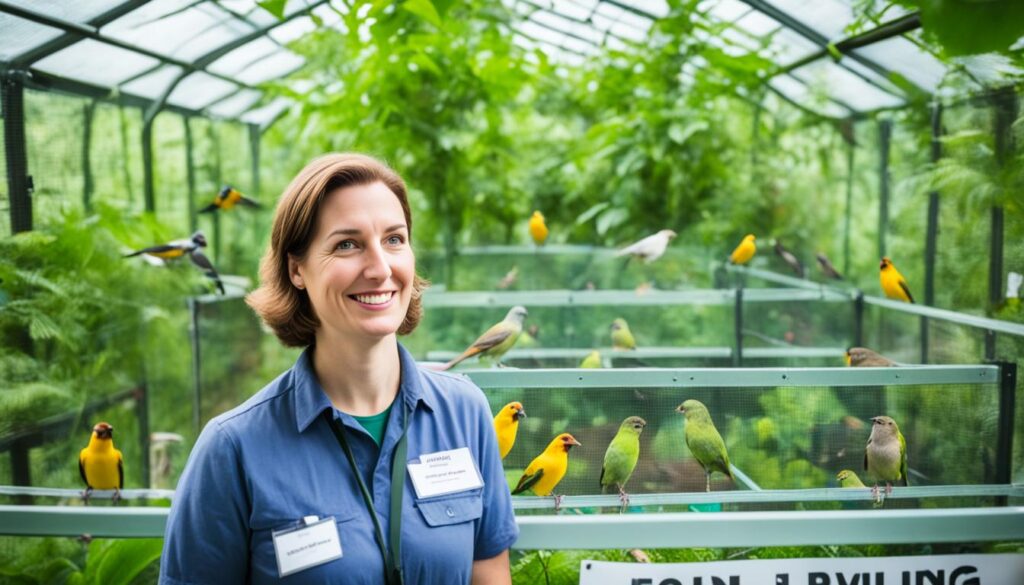
Comparison of Reputable Bird Breeders in Indiana
| Breeder | Specialty | Location |
|---|---|---|
| Wing Nuts Aviary | Princess of Wales parrots, cockatiels, lovebirds | Indianapolis |
| Dojea’s Nest | Parrotlets, budgies, rosie bourkes | Fort Wayne |
| Royal Wings Aviary | African Greys, Indian Ringneck Parakeets, Plumhead Parakeets | Evansville |
| K&M Breeding | American and English Budgies, Cockatiels, Lovebirds | South Bend |
| Country Birds Aviary | Congo African Greys, BH Caiques, Quakers | Lafayette |
Bird Breeders in Indiana: A List of Reputable Breeders
Are you in search of reputable bird breeders in Indiana? Look no further! We have compiled a list of top-notch breeders who provide healthy and well-cared-for birds. Whether you’re interested in parrots, cockatiels, lovebirds, or other species, these breeders have a wide variety of options to choose from.
| Breeder | Specialties |
|---|---|
| Wing Nuts Aviary | Princess of Wales parrots, cockatiels, lovebirds, and more |
| Dojea’s Nest | Parrotlets, budgies, rosie bourkes, and various bird species |
| Royal Wings Aviary | African Greys, Indian Ringneck Parakeets, Plumhead Parakeets, and more |
| K&M Breeding | American and English Budgies, Cockatiels, Lovebirds, and more |
| Country Birds Aviary | Congo African Greys, BH Caiques, Quakers, and other species |
These breeders have a strong reputation for providing high-quality birds and exceptional care. Whether you’re looking to add a new feathered friend to your family or expand your aviary, you can trust these reputable breeders to meet your needs.
Check out their websites for more information and available bird species:
- Wing Nuts Aviary
- Dojea’s Nest
- Royal Wings Aviary
- K&M Breeding
- Country Birds Aviary
Connect with these reputable bird breeders in Indiana and find your perfect feathered companion!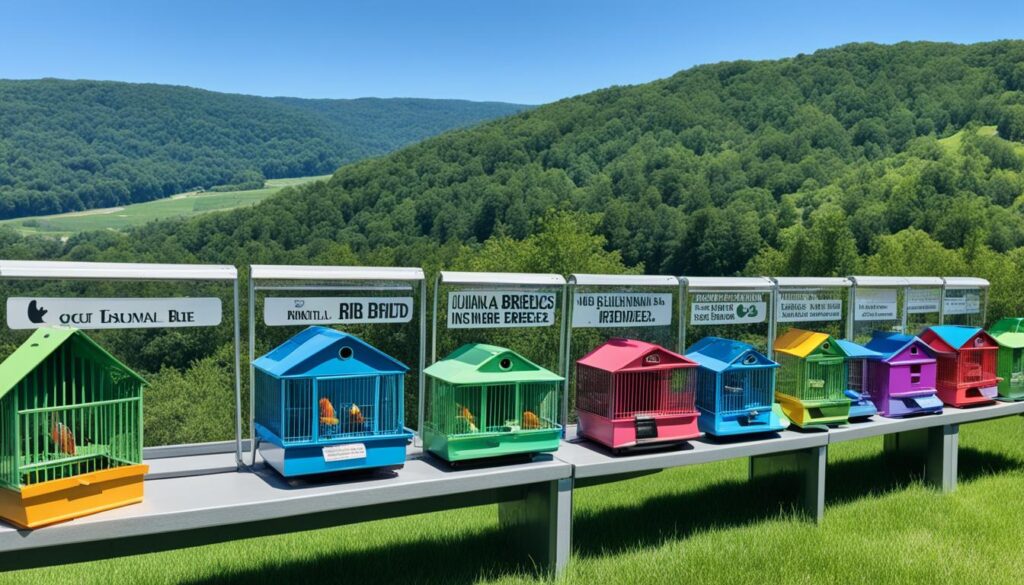
Additional Bird Breeders in Indiana
In addition to the breeders mentioned above, there are several more bird breeders in Indiana that are worth considering for your avian adventure. These breeders offer a wide variety of bird species, ensuring that you can find the perfect feathered companion for your home or aviary.
Here are some additional bird breeders in Indiana:
- Morgan Spring Aviary: This breeder specializes in breeding Cockatiels, Rosy Bourke’s, and Eastern Rosellas. Whether you’re looking for a colorful Rosella or a melodious Cockatiel, Morgan Spring Aviary has a variety of options to choose from.
- Keiko’s Abundant Blessings: If you’re interested in English Budgerigars, Society Finches, or Parrot Finches, Keiko’s Abundant Blessings is the breeder to consider. They offer a diverse selection of finches and budgerigars, known for their vibrant colors and cheerful personalities.
- L & R Fancy Feathers: This breeder specializes in breeding Nanday Conures, White-eyed Conures, and other species. From the lively Nanday Conures to the affectionate White-eyed Conures, L & R Fancy Feathers provides a range of species to suit different preferences.
- Two Crazy Bird Ladies: With a focus on hand-fed birds, including Cockatiels, Parrotlets, and Parakeets, Two Crazy Bird Ladies offers well-socialized and friendly avian companions. Their carefully raised birds make great additions to any bird-loving home.
- Wing Nuts Aviary: Wing Nuts Aviary specializes in breeding rare and exotic bird species like Brown-Necked Cape Parrots and Bronze Wing Pionus. If you’re looking for a unique and captivating bird, Wing Nuts Aviary is the breeder to explore.
When considering these additional bird breeders in Indiana, it’s important to research each breeder, visit their facilities, and ask questions about the health and genetic history of their birds. Taking the time to find a reputable breeder will ensure that you bring home a happy and healthy avian companion.
In the next section, we’ll explore how to choose the right pet bird and the characteristics to look for in a friendly bird.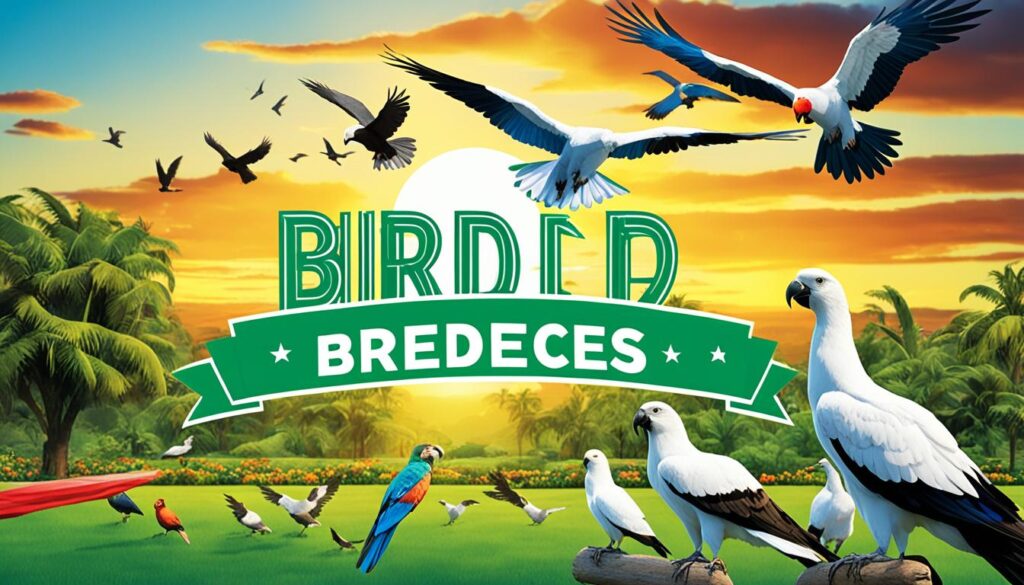
How to Choose the Right Pet Bird
When it comes to choosing a pet bird, there are several factors to consider to ensure a happy and healthy companionship. From their size to their lifespan, each pet bird species has its own unique characteristics and care requirements. By understanding these factors, you can make an informed decision and find the perfect feathered friend for your home.
Size Matters
Size is an important consideration when choosing a pet bird. While larger birds like macaws and cockatoos are striking and intelligent, they require more space and can be louder than smaller bird species. If you have limited space or live in an apartment, smaller birds like parakeets, cockatiels, and budgies can be wonderful companions.
Life Expectancy
Pet birds have varying lifespans, and it’s crucial to consider the long-term commitment involved in caring for them. Some smaller species like canaries and finches typically live between 5 to 10 years, while larger parrots can live for several decades. Understanding a bird’s lifespan is essential as it impacts your responsibility as a pet owner and the bond you will share with your bird.
Care Requirements
Before choosing a pet bird, it’s important to research their specific care requirements. Different species have different dietary needs, grooming habits, and socialization requirements. For example, parakeets thrive on a diverse diet of seeds, fruits, and vegetables, while cockatiels need regular bathing to maintain their feather health. Consider your lifestyle and availability to provide the necessary care for your chosen pet bird.

“Choosing the right pet bird involves careful consideration of factors such as size, lifespan, and care requirements.”
Popular pet bird species to consider include:
- Parakeets: Parakeets, also known as budgerigars, are small and colorful birds that are highly social and easy to tame. They are known for their playful and interactive nature.
- Cockatiels: Cockatiels are intelligent and affectionate birds that can form strong bonds with their owners. They are also known for their beautiful crests and ability to mimic sounds.
- Budgies: Budgies, or parakeets, are small, sociable birds that are relatively low-maintenance. They are highly adaptable and can thrive in various environments.
By considering the size, lifespan, and care requirements of different pet bird species, you can make an informed decision and choose a bird that will bring joy and companionship to your life.
Characteristics of Friendly Pet Birds
Friendly pet birds make wonderful companions and bring joy to their owners with their playful and sociable nature. They thrive on human interaction and are known for forming strong bonds with their caretakers. If you’re considering a pet bird, here are some popular and friendly bird species to consider:
1. Parakeets
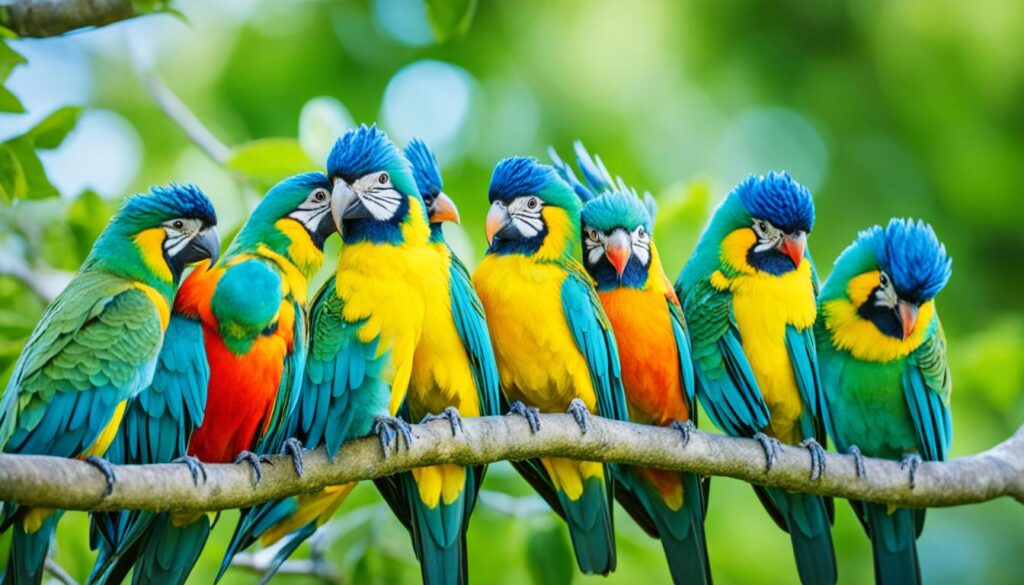
Parakeets, also known as budgerigars, are small and colorful birds that are highly intelligent and sociable. They enjoy interacting with their owners and can be trained to perform tricks. With proper socialization and care, parakeets can become affectionate companions.
2. Cockatiels
Cockatiels are friendly and charming birds that love to be part of the family. They are known for their playful demeanor and ability to mimic sounds and speech. Cockatiels thrive on attention and bonding with their owners, often forming strong and lasting relationships.
3. Lovebirds
Lovebirds are aptly named for their affectionate nature and their tendency to form deep bonds with their chosen mates or human caretakers. They enjoy spending time with their owners and are highly social birds. Lovebirds are known for their playful antics and their ability to provide love and companionship.
4. Parrotlets
Parrotlets are tiny parrots that are full of personality and love to seek out attention and interaction. They are intelligent and curious birds, often forming close relationships with their owners. Parrotlets are known for their friendly and affectionate nature, making them great companions for bird enthusiasts.
When caring for these friendly pet birds, it’s important to provide them with a stimulating environment, regular social interaction, and a balanced diet. By meeting their social and emotional needs, you can ensure that your pet bird will thrive and be a delightful addition to your home.
Reputable Bird Breeders in Other States
While this article focuses on bird breeders in Indiana, it’s worth mentioning that there are reputable breeders in other states as well. Each state has its own list of breeders who specialize in different bird species. It’s important to do research and choose a breeder that meets your specific needs, regardless of the state they are located in.
If you’re looking to expand your search for reputable bird breeders, consider exploring the following states:
- California: Home to a variety of bird breeders specializing in parrots, cockatiels, and more.
- Florida: Known for its vibrant bird breeding community, offering a wide range of species.
- Texas: Has a diverse selection of bird breeders, providing options for different types of avian enthusiasts.
- New York: Houses reputable breeders offering various bird species, including parakeets and finches.
- Arizona: A state with a thriving bird breeding scene, known for its beautiful and unique species.
Remember to research each breeder thoroughly, inquire about their breeding practices, and ask for references if needed. Choosing a reputable bird breeder ensures that you bring home a healthy and well-cared-for bird.
Reputable Bird Breeders in Other States
| State | Reputable Bird Breeders |
|---|---|
| California | Parrots R Us, Feathered Friends Aviary, Wing Haven Birds |
| Florida | Tropical Wings Aviary, Sunshine Birds, Avian Paradise |
| Texas | Lone Star Aviaries, Feathered Nest Bird Farm, Texas Bird Breeders |
| New York | Big Apple Birds, Empire Aviary, The Finch Farm |
| Arizona | Desert Sky Aviary, Sonoran Wings, Arizona Exotic Birds |
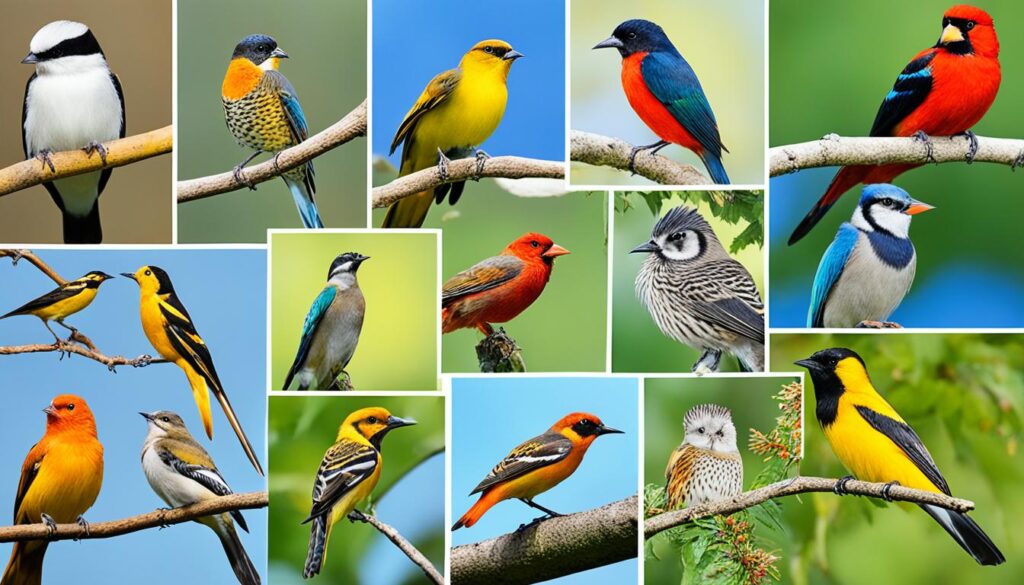
Tips for Choosing a Bird Breeder
Choosing the right bird breeder is crucial to ensure you bring home a healthy and well-cared-for bird. Here are some tips to help you make an informed decision:
- Experience: Look for breeders with years of experience in aviculture. Experienced breeders have knowledge and expertise in breeding and caring for birds, ensuring the best quality birds for their customers.
- Cleanliness: Visit the breeder’s facility or ask for pictures to assess the cleanliness and hygiene standards. Clean and well-maintained facilities are indicative of a breeder’s dedication to the birds’ well-being.
- Health of Birds: Inquire about the breeder’s health protocols and ask for documentation of the birds’ veterinary care. A reputable breeder prioritizes the health of their birds and ensures they are regularly checked by a veterinarian.
- References and Reviews: Ask the breeder for references or read reviews from previous customers. Feedback from satisfied customers can give you confidence in the breeder’s credibility and the quality of their birds.
“Choosing a reputable breeder is essential to bring home a healthy and happy feathered friend.”
By considering these tips, you can find a bird breeder who provides you with a quality bird that will bring joy and companionship to your life.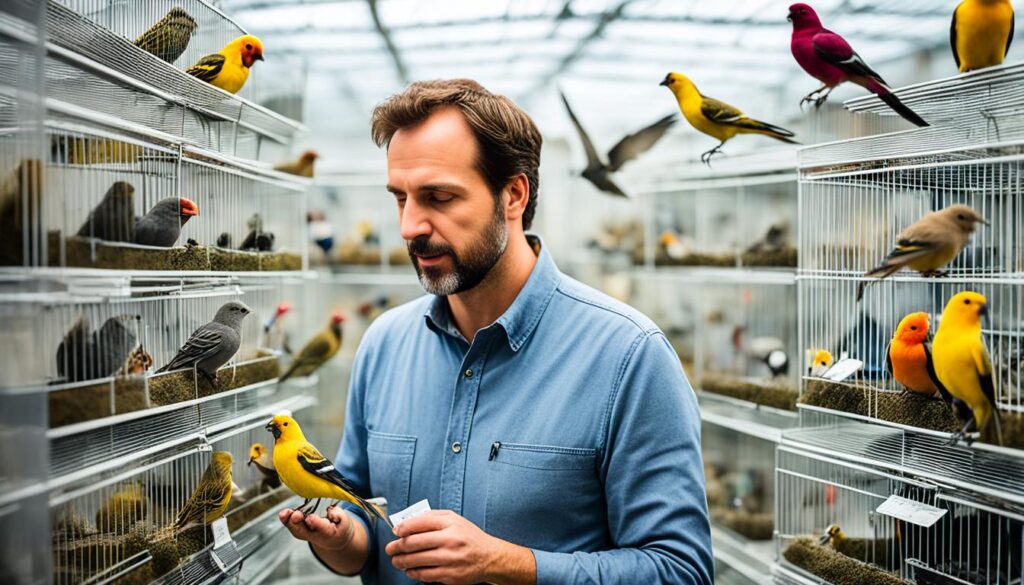
| Breeder | Specializes in |
|---|---|
| Wing Nuts Aviary | Princess of Wales parrots, cockatiels, lovebirds, and more |
| Dojea’s Nest | Parrotlets, budgies, and rosie bourkes |
| Royal Wings Aviary | African Greys, Indian Ringneck Parakeets, and Plumhead Parakeets |
| K&M Breeding | American and English Budgies, Cockatiels, Lovebirds, and more |
| Country Birds Aviary | Congo African Greys, BH Caiques, Quakers, and other species |
How to Contact Bird Breeders in Indiana
If you’re interested in finding the perfect bird for your home or aviary, contacting bird breeders in Indiana is the first step. Here are some ways to get in touch with them:
Visit Their Websites
Many bird breeders have websites that provide detailed information about the breeds they offer, as well as contact information. By visiting their websites, you can learn more about the breeders, their breeding practices, and the available bird species. You can also find their email addresses or phone numbers to connect with them directly.
Send an Email
Sending an email is a convenient way to contact bird breeders in Indiana. You can ask questions about specific bird species, inquire about availability, or schedule a visit to the breeding facility. When composing your email, be clear and concise in your inquiries to ensure a prompt response.
Give Them a Call
If you prefer immediate communication, giving bird breeders a call is a great option. Most reputable breeders provide their phone numbers on their websites or social media pages. Calling allows you to have a real-time conversation, ask detailed questions, and get a better understanding of the breeder’s knowledge and experience.
Remember, when contacting bird breeders, it’s essential to be respectful of their time and ask relevant questions. Establishing a good rapport with the breeder can help you build a positive and trustworthy relationship.
Whether you choose to visit their websites, send an email, or make a phone call, reaching out to bird breeders in Indiana is the key to finding your feathered companion.

Benefits of Choosing a Reputable Bird Breeder
Choosing a reputable bird breeder comes with numerous benefits for both you and your future feathered friend. Reputable breeders prioritize the health and well-being of their birds, ensuring that you bring home a happy and healthy bird.
One of the key advantages of choosing a reputable breeder is the assurance that the birds have been well-cared for. Reputable breeders provide a clean and safe environment for their birds, ensuring they are properly fed, exercised, and receive necessary veterinary care.
Moreover, reputable bird breeders are knowledgeable and transparent about their birds’ genetic history. They provide accurate information about the lineage, health screenings, and any potential genetic concerns, helping you make an informed decision when selecting your bird.
When you choose a reputable breeder, you also gain access to their expertise and support. Reputable breeders are typically invested in the well-being of their birds even after they have left their care. They offer guidance on bird care, diet, training, and any potential challenges that may arise along the way.
By selecting a reputable bird breeder, you can have peace of mind knowing that you are bringing home a quality bird that has been lovingly raised and properly cared for. This ensures a smooth transition into your home and enhances the bond between you and your new feathered companion.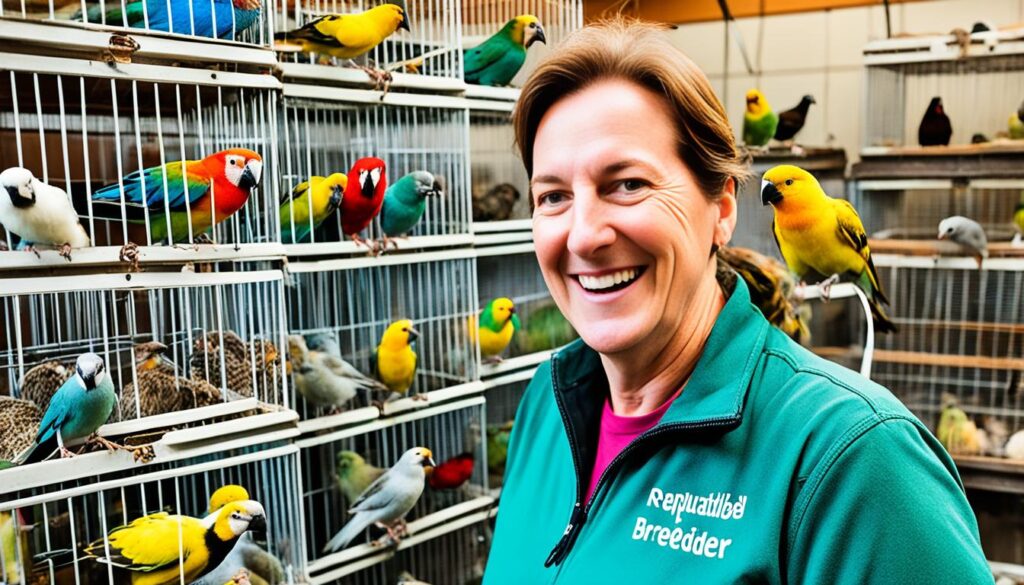
Testimonial
“Choosing a reputable bird breeder was the best decision I made when adopting my bird. The breeder’s dedication to raising healthy and well-socialized birds was evident from the start. Their ongoing support and guidance have been invaluable to me as a new bird owner.”
– Jane Smith, Happy Bird Owner
Conclusion
In conclusion, if you’re looking for a reputable bird breeder in Indiana, you’re in luck. Indiana is home to a diverse range of bird breeders who offer a wide variety of bird species. Whether you’re a beginner or an experienced bird enthusiast, these breeders provide valuable services and healthy birds for those looking to add a feathered friend to their home or aviary.
When choosing a bird breeder, it’s crucial to do your research and consider factors such as their licensing, health practices, and the overall well-being of their birds. By making an informed decision, you can ensure that you are bringing home a bird from a reputable source.
Take the time to connect with different breeders, visit their facilities, and ask questions about their breeding practices. By doing so, you can find the perfect bird that suits your preferences and requirements. Whether you’re interested in parrots, cockatiels, lovebirds, or other species, Indiana’s bird breeders have a lot to offer.
FAQ
Are there reputable bird breeders in Indiana?
What should I consider when searching for a bird breeder in Indiana?
Can you provide a list of reputable bird breeders in Indiana?
Are there any additional bird breeders in Indiana worth considering?
What are some popular pet bird species to consider?
Which bird species are known for being friendly?
Are there reputable bird breeders in other states?
What factors should I consider when choosing a bird breeder?
How can I contact bird breeders in Indiana?
What are the benefits of choosing a reputable bird breeder?
How can bird breeders in Indiana help bird enthusiasts?
Laura is a versatile writer and editor whose passion for animals shines through in her work. With a keen understanding of language and a love for storytelling, Laura crafts compelling narratives that captivate our audience and inspire action regarding animal welfare. Whether she’s delving into the latest research or sharing heartwarming stories of animal companionship, Laura’s work will leave a lasting impression on all who read it.
Pet Birds
Top 5 Exotic Bird Breeders in Arizona
Discover the exceptional exotic bird breeders in Arizona, from Arizona Bird Store to AZ Exotic Bird Rescue, offering unique avian companionship experiences and expert care.
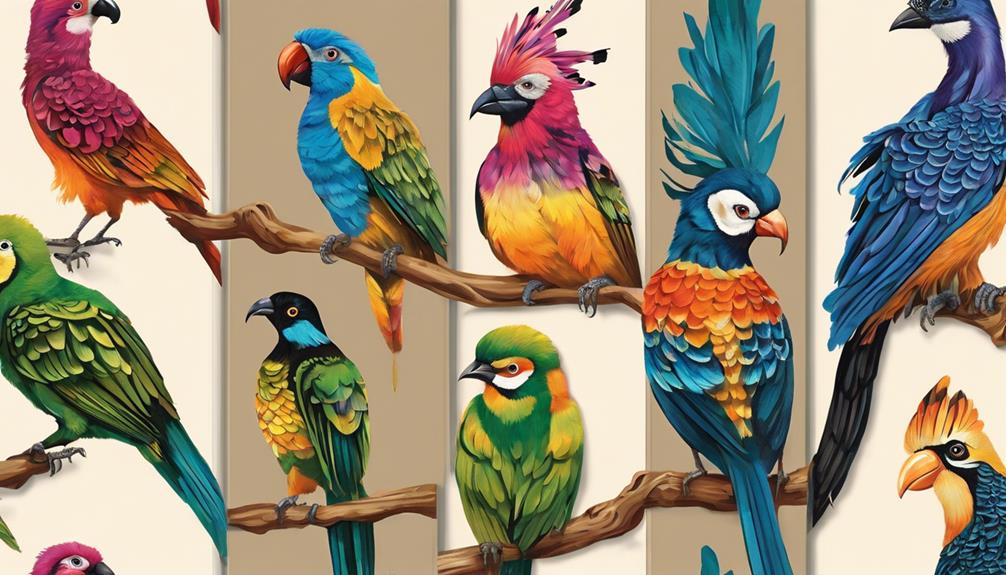
In our search for the best exotic bird breeders in Arizona, we have come across several reputable options. The Arizona Bird Store excels in providing high-quality birds and valuable guidance. Birds, and Then Some offers a diverse selection of pet birds with a strong focus on health and well-being. Pretty Feathers Bird Store offers top-notch care for its feathered residents and sells quality bird-related products. AZ Exotic Bird Rescue is committed to rescuing and rehoming exotic birds while promoting responsible ownership. Lastly, Birdz & Beyond is known for its outstanding bird care services and spacious facility.
Explore these top breeders for a fulfilling experience in avian companionship.
Key Takeaways
- Arizona Bird Store: Reputable breeder with diverse exotic birds.
- Birds, and Then Some: One-stop destination for exotic bird lovers.
- Pretty Feathers Bird Store: Premium care for exotic birds.
- AZ Exotic Bird Rescue, Inc: Rescues and rehomes exotic birds responsibly.
- Birdz & Beyond: Renowned for exceptional care and variety of exotic birds.
Arizona Bird Store
Located in Mesa, Arizona, the Arizona Bird Store stands out as a reputable and top-tier bird breeder known for its exceptional quality birds and services. The store offers a diverse selection of pet birds, ranging from colorful parrots to melodious canaries, catering to the preferences of bird enthusiasts. The Arizona Bird Store prides itself on providing a wide array of pet bird options, ensuring that customers can find the perfect feathered companion to suit their lifestyle and needs.
With a focus on bird health and well-being, the Arizona Bird Store sets itself apart as a trusted source for high-quality birds and bird-related products in Mesa, Arizona. The knowledgeable staff at the store is dedicated to assisting customers in selecting the ideal pet bird and offering valuable advice on bird care and maintenance. Whether you're a seasoned bird owner or a first-time bird enthusiast, the Arizona Bird Store is committed to providing a welcoming and informative environment for all pet bird lovers.
Birds, and Then Some

At Birds, and Then Some in Phoenix, Arizona, visitors can expect a diverse array of pet birds and all-encompassing bird-related products and services. This establishment, located at 16026 N 32nd St, is a hub for bird enthusiasts in the United States. Their reputation for excellence stems from the quality guidance provided by their knowledgeable staff on bird care, ensuring the health and well-being of all their birds. Customers can contact them at +1 602-548-0133 or visit their website at [Birds, and Then Some Facebook page](https://www.facebook.com/birdsandthensome) for more information.
| Services | Products |
|---|---|
| Bird Boarding | Cages |
| Grooming | Toys |
| Veterinary Care | Food & Treats |
| Behavioral Training | Accessories |
The diverse selection of pet birds coupled with a wide range of bird-related products and services makes Birds, and Then Some a one-stop destination for all bird lovers in Phoenix, Arizona.
Pretty Feathers Bird Store
Nestled in Apache Junction, Arizona, Pretty Feathers Bird Store stands as a reputable establishment offering a diverse selection of birds and high-quality bird-related products.
At Pretty Feathers Bird Store, bird enthusiasts can find a wide range of exotic birds, from colorful parrots to melodious canaries. The store prides itself on providing excellent care for all their feathered residents, making sure they're healthy and well-socialized.
In addition to live birds, Pretty Feathers Bird Store also offers an array of premium bird-related products, including nutritious bird food, spacious cages, and engaging toys to keep pet birds happy and stimulated.
- Variety of Birds: Pretty Feathers Bird Store offers a diverse selection of exotic birds.
- Quality Care: The store focuses on providing excellent care for all their feathered residents.
- Premium Products: Customers can find high-quality bird-related products like nutritious bird food and engaging toys.
- Healthy Birds: Pretty Feathers Bird Store makes sure that all their birds are healthy and well-socialized.
AZ Exotic Bird Rescue, Inc
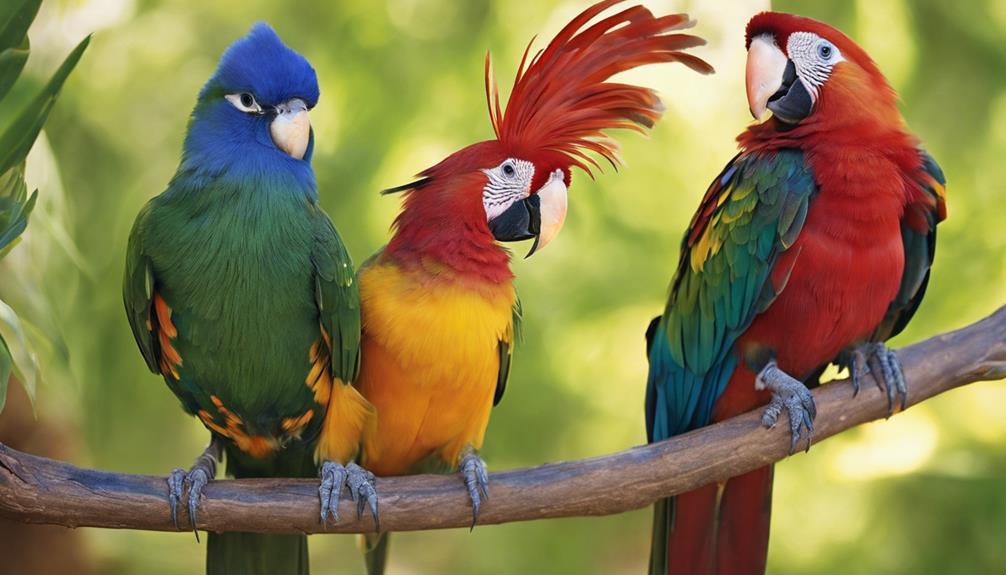
AZ Exotic Bird Rescue, Inc., situated on N Scottsdale Rd in Scottsdale, AZ, actively engages in rescuing and rehoming a variety of exotic birds, emphasizing education and adoption programs. The organization's dedication to bird welfare is evident in their successful facilitation of over 200 bird adoptions, ensuring these beautiful creatures find loving homes. They offer an adoption program that allows individuals to provide a forever home for rescued birds, emphasizing the importance of responsible pet ownership. Additionally, AZ Exotic Bird Rescue, Inc. conducts educational workshops on bird care, equipping bird owners with the knowledge and skills needed to provide excellent care for their feathered companions.
| Services Provided | Details |
|---|---|
| Adoption Program | Facilitated over 200 adoptions |
| Educational Workshops | Focus on bird care |
| Rescue Efforts | Rehoming exotic birds |
Birdz & Beyond
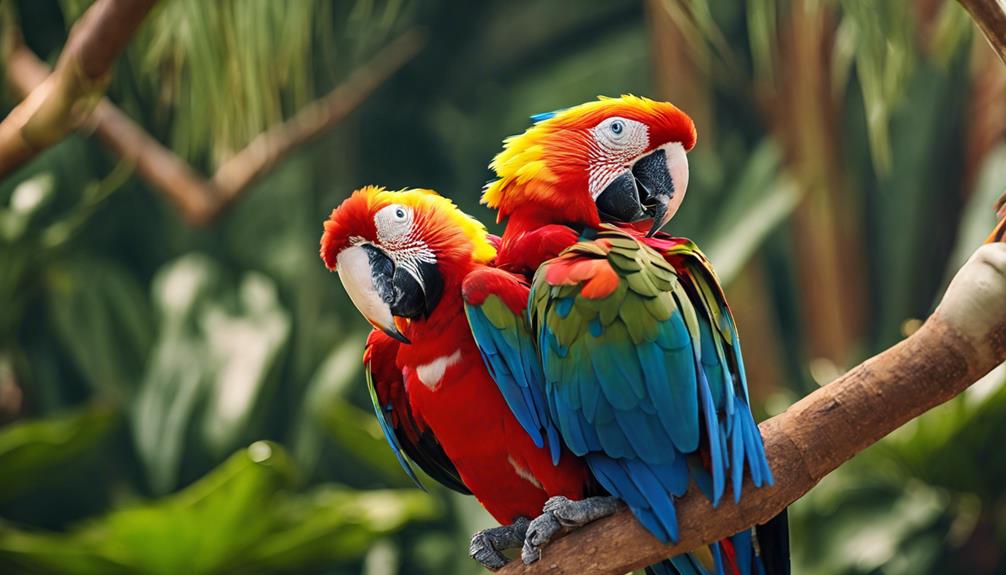
Located in Phoenix, Arizona, Birdz & Beyond offers a diverse selection of exotic birds and related products, known for its exceptional bird care services and high-quality products. The facility at 3519 W Thunderbird Rd is large enough to accommodate various bird species comfortably.
Here are some key features of Birdz & Beyond:
- Quality Care: Birdz & Beyond is renowned for its exceptional bird care services, ensuring that all birds are healthy and well looked after.
- Variety of Exotic Birds: The establishment offers a wide range of exotic birds, allowing customers to choose from various species.
- High-Quality Products: Birdz & Beyond not only provides birds but also offers premium products for bird care and maintenance.
- Room to Move Around: The spacious environment at Birdz & Beyond allows birds to move around freely, promoting their physical well-being.
Visit Birdz & Beyond at 3519 W Thunderbird Rd or contact them at +1 602-993-4700 to experience their exceptional services firsthand. Follow them on Instagram at [Birdz & Beyond](https://www.instagram.com/birdzandbeyond/) for more insights into their offerings.
Frequently Asked Questions
What Kind of Bird Is Green With an Orange Head in Arizona?
We believe the bird described as green with an orange head in Arizona is likely the Mitred Conure, a striking parrot species. These medium-sized birds from South America are popular for their vibrant colors and friendly, social behavior.
How Did Love Birds Get to Arizona?
Love birds were introduced to Arizona as exotic pets, arriving through pet trade channels and breeding programs. Their vibrant colors and playful nature made them popular choices. Arizona's warm climate and suitable habitat conditions support the breeding and maintenance of love birds.
Are Peach Faced Lovebirds in Arizona?
Yes, Peach Faced Lovebirds are in Arizona. They thrive in the warm climate and can be found in urban areas, parks, and gardens. Their vibrant colors and social nature make them popular among bird enthusiasts for their beauty and playful personalities.
Are Rosy-Faced Lovebirds Native to Arizona?
No, rosy-faced lovebirds are not native to Arizona. Indigenous to southwestern Africa, they have become popular pets in the U.S. Although not found in the Arizona wild, understanding their natural habitat is essential for care and conservation efforts.
Are Exotic Bird Breeders in Ohio as Reputable as Those in Arizona?
When it comes to finding top bird breeders, Ohio boasts a reputable selection. However, Arizona is also home to top bird breeders known for their expertise and high-quality birds. Whether in Ohio or Arizona, it’s crucial to thoroughly research and visit breeders before making a purchase.
Conclusion
To sum up, the top 5 exotic bird breeders in Arizona offer a diverse range of species for bird enthusiasts. Each breeder provides expert care and knowledge to guarantee the well-being of their feathered friends.
As we spread our wings and explore the world of exotic birds, let's remember that every bird is as unique as a rare gem, waiting to be discovered and cherished.
Fly high and embrace the beauty of these magnificent creatures.
Paul’s love for animals knows no bounds. As a dedicated writer and animal lover, Paul brings a unique perspective to our team. His firsthand experiences with various animals enrich our content and provide valuable insights into their behavior and needs. Whether he’s sharing tips for pet care or shedding light on pressing conservation issues, Paul’s passion for animals shines through in everything he does.
-
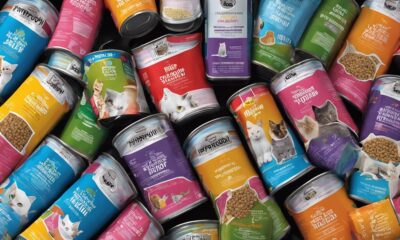
 Vetted2 months ago
Vetted2 months ago15 Best Cat Foods for Managing Hyperthyroidism – Vet Approved and Feline Friendly
-
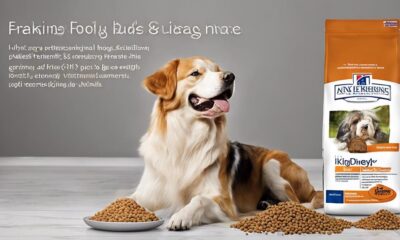
 Vetted2 months ago
Vetted2 months ago15 Best Dog Foods for Kidney Disease – Expert Recommendations for Your Pet's Health
-
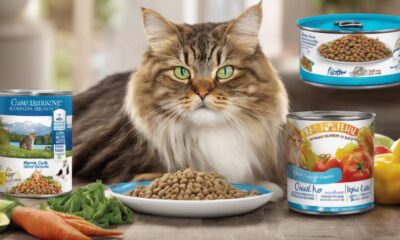
 Vetted2 months ago
Vetted2 months ago15 Best Wet Cat Foods for Older Cats to Keep Them Healthy and Happy
-

 Vetted2 months ago
Vetted2 months ago14 Best Homemade Dog Food Recipes Your Pup Will Love – Vet Approved & Nutritious
-

 Vetted2 months ago
Vetted2 months ago15 Best Fresh Dog Food Delivery Services for Your Pup's Health and Happiness
-

 Animal Facts2 months ago
Animal Facts2 months agoSpring Animals: A Guide to Seasonal Wildlife
-
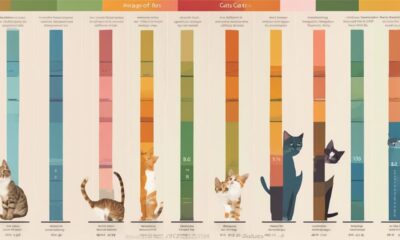
 Cats2 months ago
Cats2 months agoCat Weight Chart by Age: Kitten to Senior in Lbs
-

 Cats2 weeks ago
Cats2 weeks agoTop 5 Cat Breeders in Arkansas: A Guide






















